#bsd language analysis
Explore tagged Tumblr posts
Text
Kōyō and Mori related post, part 2
... about that problematic Mori's phrase from ch 37
Please read [Part 1] before reading this
[In Russian] and [abt translation of this dialogue in Russian]
@emilover-1 and @plinko-mori, I hope you'll read it once 𖹭 Happy new year!
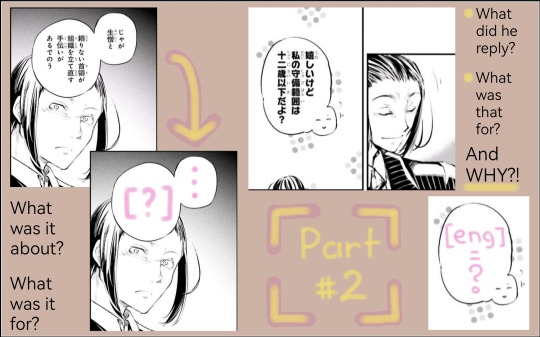
And about his line of behaviour in this situation at all.
Previously Kōyō said: Of course. But sad to say, I need to help our unreliable boss get this organization back in order. The one to whom my hatred belongs is your predecessor. Right now, I'm feeling pretty good about being here.
(Japanese: 無論じや。じゃが生憎と頼りない首領が組織を立て直す手伝いがあるでのう。彼の人の仇は先代じゃ。今は此処が気に入っておる)
What did Mori reply (in Japanese)?
He said: 嬉しいけど私の守備範囲は十二歳以下だよ?
To begin with, during the research process, let's maintain absolute neutrality.
meme (or not meme) about it ↘️
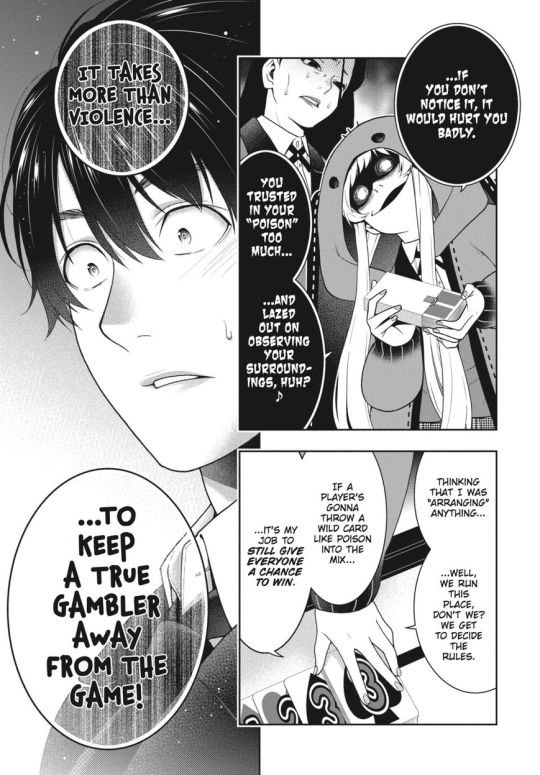
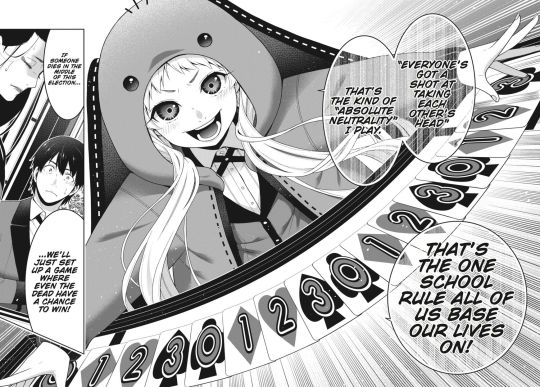
Now you are ready, so we're gonna dissect this fucking phrase!
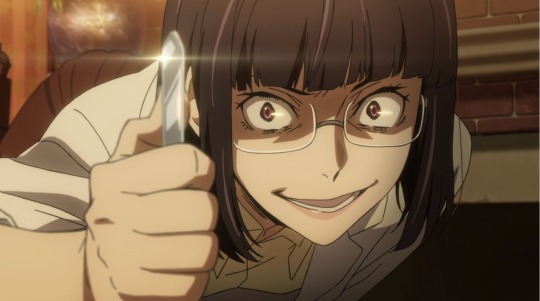
The best known translation are:
I'm quite happy you said that, but I'm only interested in those under 12 years old.
I'm very glad to hear that, but I'm only interested in those under 12, you know?
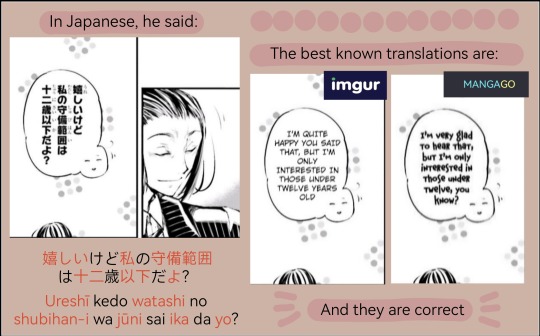
Please, don't worry.
嬉しい - happy, glad. Here = «I'm quite happy you said that», «I'm very glad to hear that» (I prefer the second one, because it rhymes. There wasn't something like this in Japanese version, and I didn't see it in Russian, but here... 🥺 Let them talk in rhyming banter with each other). From the beginning Mori choose the opposite line to her words «sad to say», 生憎と. It's funny.
けど - «but», follows is contradictory to what comes before. (And you use が to say «but» when ideas are in contrast)
私 - I (official or just gender neutral version of the pronoun «I», using by many people now)
私の - my
守備範囲 - that fucking word 😒🙄🫣
Dictionary says:
しゅびはんい — 守備範囲 — noun
area of the field one is supposed to (or able to) defend (sports term)
(one's) field, (one's) scope, area of expertise, range of topics one can converse about, breadth of one's interests and knowledge
one's type, kind of person one is attracted to
You can use this word meaning «defence» only when you talk about sport. So this isn't about defence in Mori's phrase. Even Japanese dictionaries say so:
Goo:
守備範囲
スポーツで、自分の守るべき範囲。また、守ることができる範囲。スポーツ = sport, スポーツで = in sport. Meaning: «The scope of one's protection. Also, the extent to which it can be protected
自分がすべきことの範囲。また、自分ができることの範囲。«The scope of what you should do. Also, the scope of what you can do»
Weblio:
守備範囲
守ることができる範囲、または守るべき範囲、などを意味する表現 。 That sport term.
趣味・嗜好・異性の顔の造作などにおいて、好みとする対象の広さなどについて言う場合もある。«It may also refer to the extent of one's preference in hobbies, tastes, facial features of the opposite sex, etc.»
The best words to keep together 2nd and 3rd parts from English dictionary entry is «something what you are interested in». Because there's a probability he meant 2nd part and there's a probability he meant 3nd.
は - you really wanna know? Go and read about grammar. Okie, it's the word you use to mark the topic. [Link for grammar]
十二 = 12
歳 - years old
以下 - under
だ - marks present tense and positive sentences. (There are other ways for other sentences) It's a casual form of です. [Link for だ grammar] and [Link for difference between だ and です]
よ - «It indicates that the speaker is offering new information or a new perspective to the listener. Or at the very least, it gives the impression that something new is being offered.» Someone who translated manga added «you know?» for this nuance. [Link]
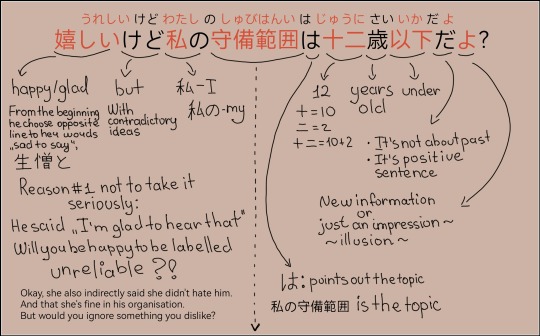
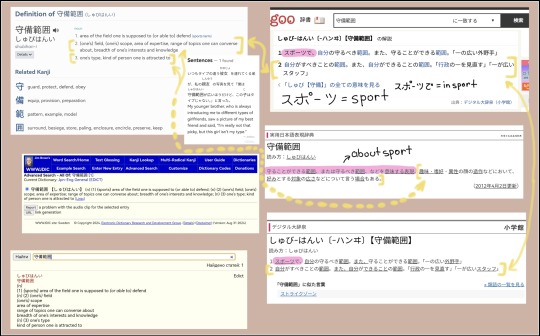
Mori replied «I'm very glad to hear that, but I'm only interested in those under twelve years old, you know?» Sorry, not sorry, it's really these words.
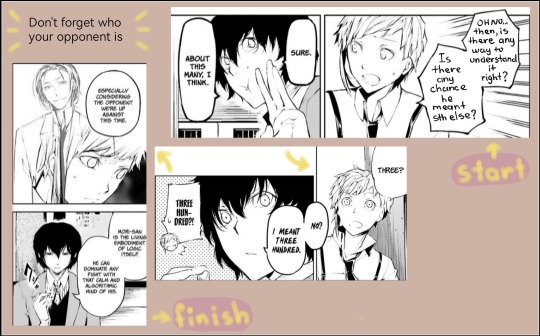
But the game ain't over at all!
What was it about? You know, words, it's a complicated thing...
Noticed something about «glad/happy»? It sounds a bit strange. He can be happy 'cause she doesn't hate him, or she is content to be here. But after the words «unreliable boss»? Is it irony?
Some thoughts of meaning:
Kōyō, but you are an adult! Stop insulting; stop attacking friends! You aren't Elise (Mori, you really thought at least one of them would stop?) In this case, does Elise have Kōyō's traits?
«You hate only the former boss + You like to be here» ➡️ «You like / love me, right? Oh, you know, with your childish behavior, if you were 12, I might have liked you too, maybe» 🤣 Remember, she canonically doesn't love «love». Mori just fights back.
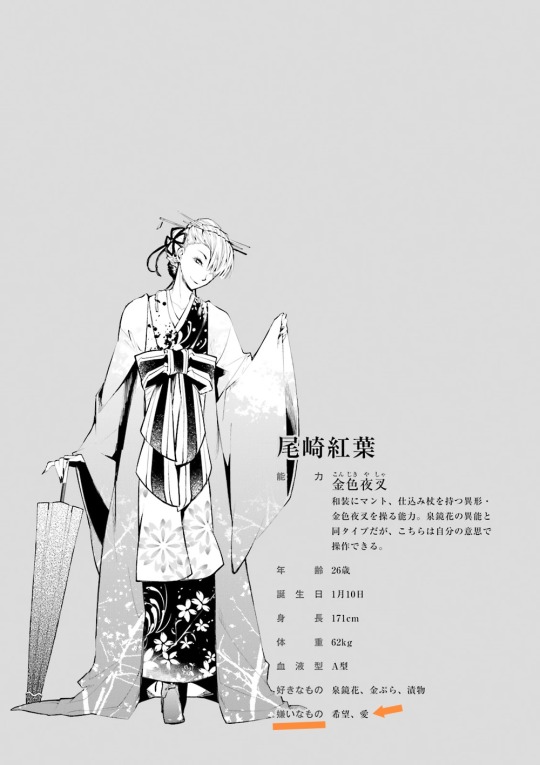
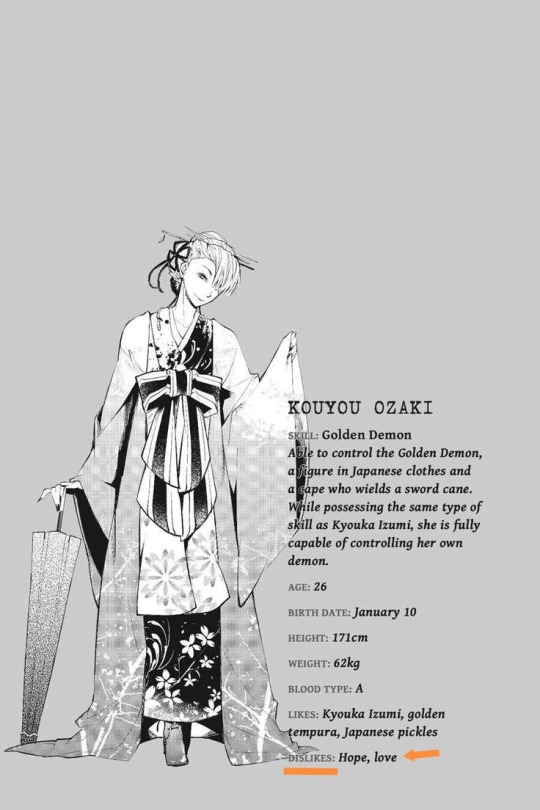
On the other hand, I've heard the version that her words could be a romantic thing. But then he's just a master at shooting people down in the most cringe-worthy way.
Another point: it could be something like «Oh my, you really tHaT oLd? Are you seriously saying you can teach me running the organization? Behave yourself, my another traumatized adopted child» Some years ago she was angry when Chūya called her «Ane-san», but now 🤭

In any case, he made her feel uncomfortable with his shitty words. That's the punishment for willfulness and impoliteness (?)
Why, or what for?
Because she really hurts his feelings
Her phrase and his face are placed on the same frame. It makes sense, and it matters. Look at Mori! His eyes are open, but the lower lid is tensed / squinted, and you can see the expression lines. The iris is white – he usually has black eyes, so she's hit the mark, hit a nerve. The eyebrows are in a normal position, but it feels a little strained. The lips are composed, or there's just a general tensing of all the facial muscles.
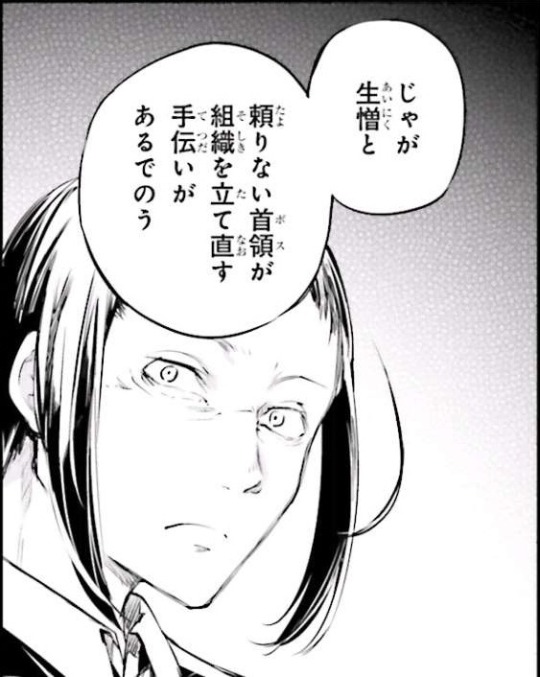
✨ Some interesting information ✨
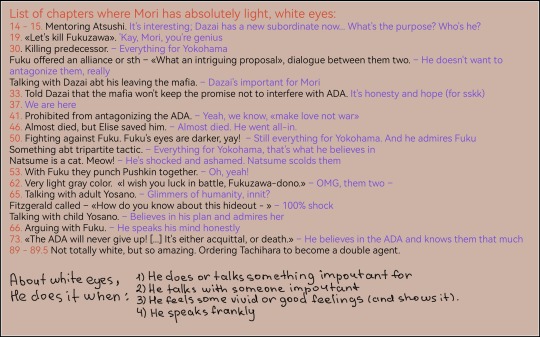
Why he smiled after - because he understood her feelings and thoughts. As an adult is surprised by a child's antics, but then shakes his head with a smile)
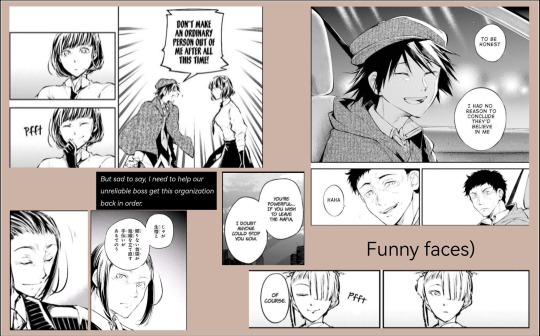
Anime makes this scene worse. Mori's reaction is too weak. All they drew was the basic emotion of surprise, and Mori is a complex character. Harukawa reflects this complexity of emotions: he's surprised, but Koyo's words also evoked displeasure (I'm 99% sure ), a little anxiety is there too (maybe 60-70% sure), insecurity, fear and regret are likely there.
He isn't shocked just a bit surprised but almost calm
For comparison:
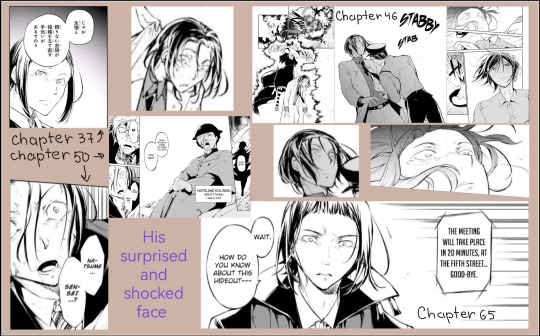
In anime, I like to hear their voices and sound effects. The musical background puts a clear emphasis on the phrase koyo, this is the punchline of the dialogue.
I don't wanna say that Bones didn't try to do their best, but Harukawa is... an entirely different matter. There's no comparison to begin with. Just as... nobody would compare Goddess with anything, right?
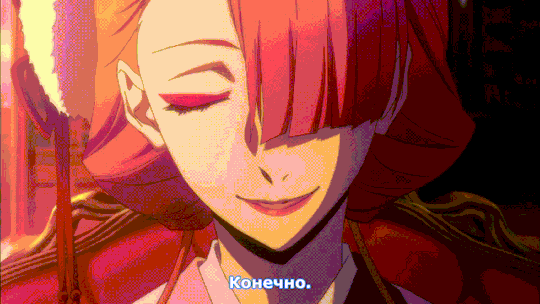
Sorry - not sorry, I'm too lazy to do another gif with eng sub. «Конечно» = «Of course», « К сожалению, мне нужно помочь неуклюжему лидеру восстановить организацию» = «But sad to say, I need to help our unreliable boss get this organization back in order», «Я благодарен, но интересуюсь только теми, кому меньше 12» = «I'm glad to hear that, but I'm only interested in those under , you know?»
And she isn't t that calm yelling at him: «SHUT THE FUCK UP! I will sew your lips together!», if you pay attention to the size of kanji and lines of speech bubble.
Yes, 黙れ is a very rough word. Don't use it, please.
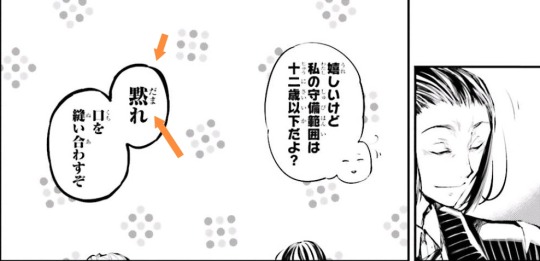
I found this scene in stage play here, file with stage plays, «Bungo Stray Dogs on stage 3». Timeline: start at 2:16:33 and end at 2:17:50
But video shows HER face when she's saying that phrase, so I can't say anything about Mori's facial expression in that moment 😭 How could them -
There's no «彼の人の仇は先代じゃ。今は此処が気に入っておる» (The one to whom my hatred belongs is your predecessor. Right now, I'm feeling pretty good about being here) Both anime and stage play cut these sentences out. Why? The next Mori's phrase looses its sense a little bit in this way, isn't it?! Wtf
Anyway, right after she said her part, and Mori replied, and then she said «damare…», they laughed together. ¯\_(ツ)_/¯
'Cause he's boss
And the insubordination (or something similar) didn't vanish. Akutagawa is his own punishment; honestly, I'm totally agree. But Kōyō – he's just… Taunting her? Hahaha. Best boss ever, isn't he?
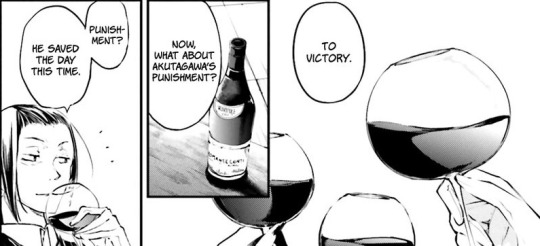
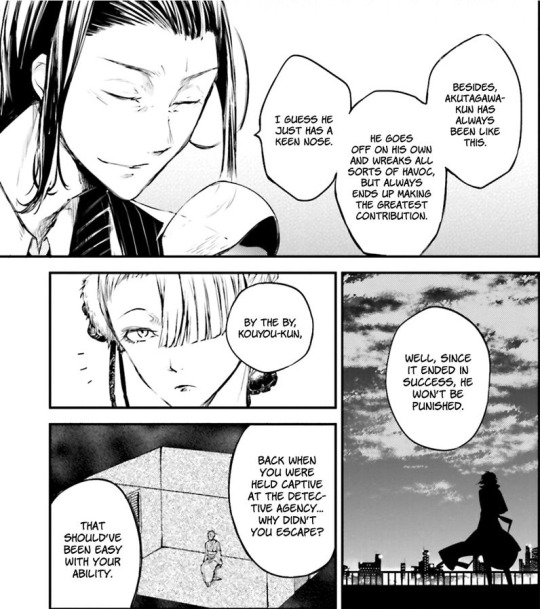
Whatever he meant, she's not okay with these words and we're too. That's the whole punishment. Just to check the box ✅
Boss-of-the-Port-Mafia-Mori-Ougai be like:
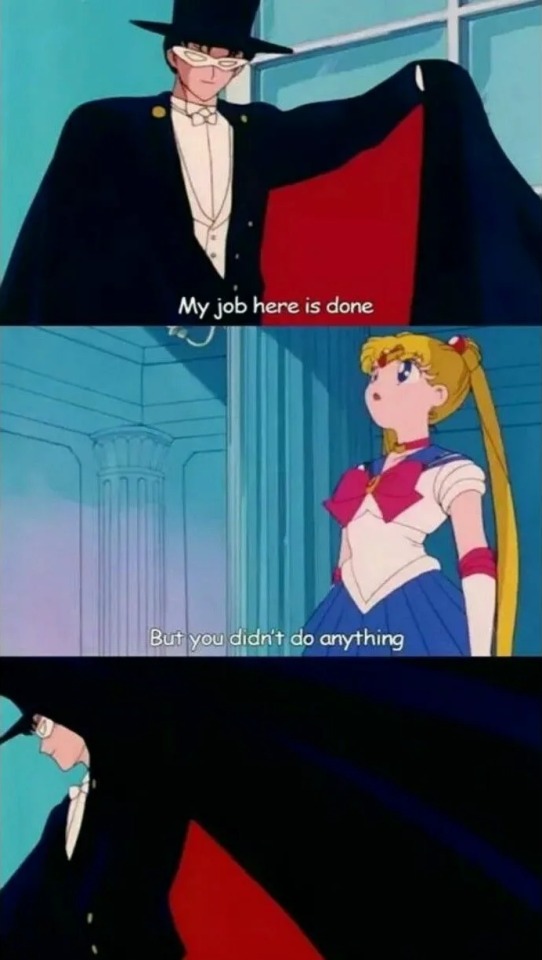
And because Mori cares a lot about Kōyō, if you look closely
...he couldn't do something more
I see Mori-Kōyō relationship as his redemption arc. He learns to respect human soul and heart, [心]. (That actual reason why Fukuzawa and Yosano dislike him). He combines therapeutic moments for Kōyō with his «evil mafia plans.» At least he didn't want to traumatize her with the possibility of killing that girl.
It's very interesting to analyse it one day. I will, but not before I read «Kokoro» by Natsume Sōseki. They talk about character-Natsume tactic, and then there's just the concept of the [heart] / [心]. But in Japanese, you read it as [こころ], [kokoro], got it? 🧐
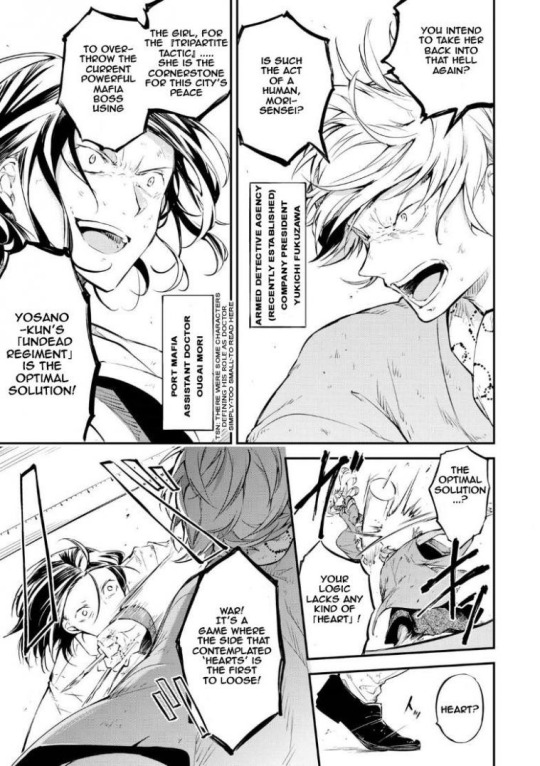
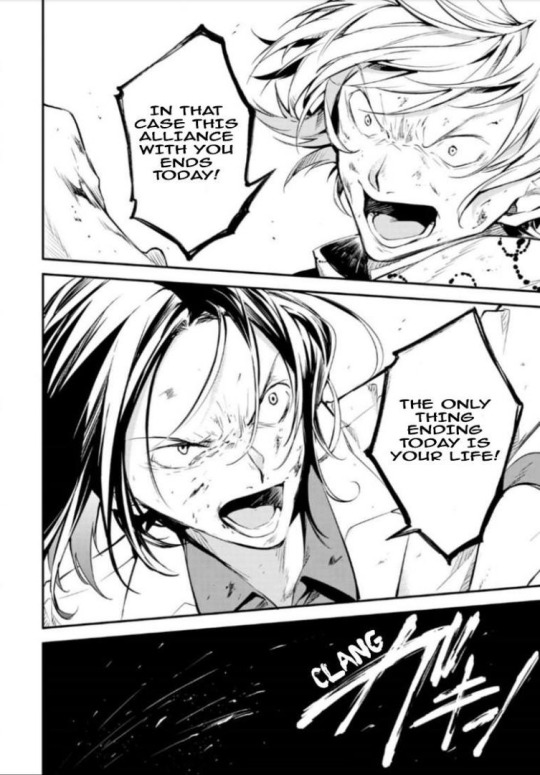
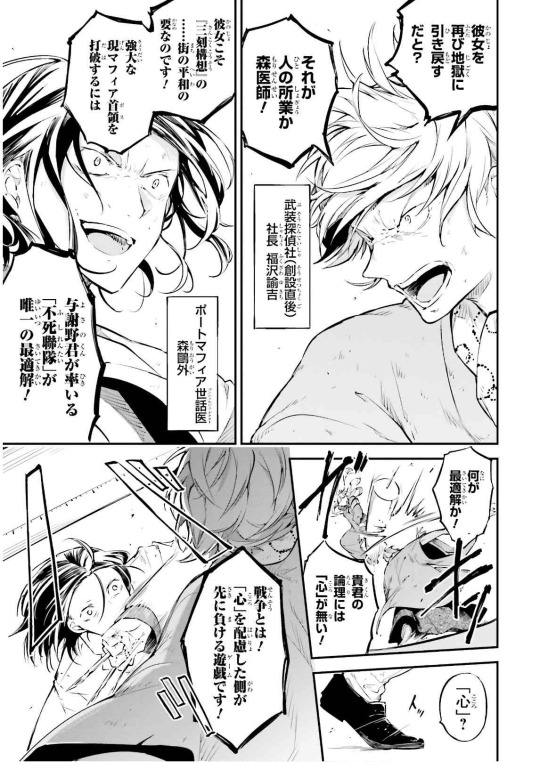
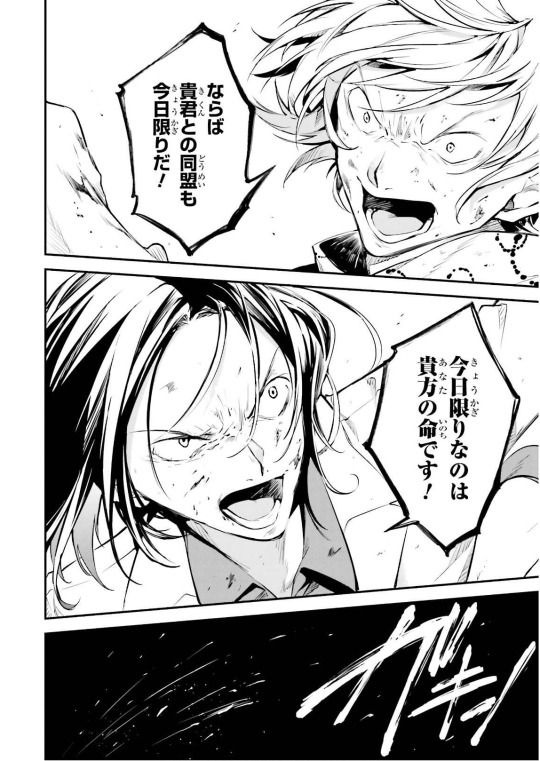
I strongly believe that Mori planned more than that. Why else would he forbid her to take Kyouka back before the conflict started? (Chapters 17-18) He let her see the light to get her away from the mafia. As he let Dazai go. As he offered Higuchi. As 14 y. o. Kōyō wanted. It's good for her to see Kyōka's story, to let her go, to become a better person than the former boss. It's her character development. Mori isn't evil. He does bad things from time to time, but he also does good things.
Guild arc wasn't an easy one for Kōyō. Even if he unintentionally triggered her trust issues and anxiety, he tried to help.
I haven't said anything about 守備範囲 as «(one's) field, (one's) scope, area of expertise, range of topics one can converse about, breadth of one's interests and knowledge», have I? Oops)
Imagine, for example... What if Fukuzawa's words were important to Mori? We didn't even know what happened between them when Rampo and Yosano escaped. Did Fukuzawa run away after «the clock struck 12»? 🤭 Or did Mori actually lose that battle? Or did he lose because he didn't want to win at all? As Natsume's "subordinate" or sth he has to do everything he can for their tactic. But as a human being, well, he regrets traumatizing Yosano. What if he not only let her go but also started learning psychology, soul science?
Kōyō is also traumatized. Mori and Dazai know this. Mori lets her go, but she isn't happy. And what's more, she's using defensive reaction. And Mori just like «You need therapy, girl. But you know, I'm a child psychologist. And it would still be a violation of medical ethics if I were your psychotherapist. (Yeah, sometimes I respect medical ethics)»
What do you think?
...
After the Yosano story, Mori is generally more relaxed about disobeying orders. Because he's not in the military. (Down with bureaucracy!)

Because he realised that if an order was broken, it could be something very important to the person. He doesn't want to break people for the sake of some discipline. And for Koyo, choosing to cooperate with the agency was part of personal growth and healing. She saw herself in Kyōka, and protecting the girl meant protecting them both, and vice versa. Mori couldn't break her. That would be unjustified. He wasn't angry at Kōyō for her decision.
Bonus. Some parallels from the Guild arc:
Mori-Dazai, Kōyō-Kyōka: «We are not the same person, actually. I'm me, you're you. You have the right to choose your path» It was about mentoring, parental love, and letting go.
Mori-Kōyō, Dazai-Akutagawa: «You become stronger. Accept your past and move on from it»
Dazai-Kōyō, Atsushi-Lucy (+ Mori as a mastermind who made these lines possible with his orders abt Kyōka and Q): «Do not abandon the past versions of ourselves»
And keep in mind 2 things:
Mori must keep a balance between etiquette, subordination, and responsibilities on the one hand and his feelings and ulterior motives on the other hand
Sometimes he's a living cringe and a lying liar who lies 😑
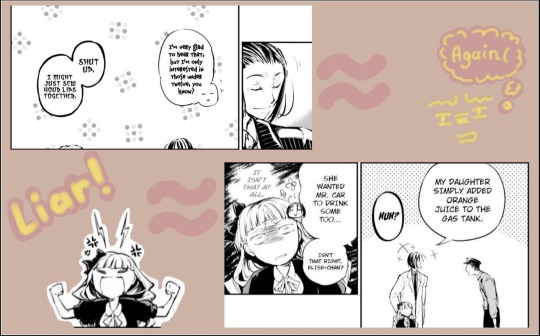
The characters' phrases cannot be viewed without context. They don't exist in a vacuum. They have reasons, occasions, and purposes for saying certain things.
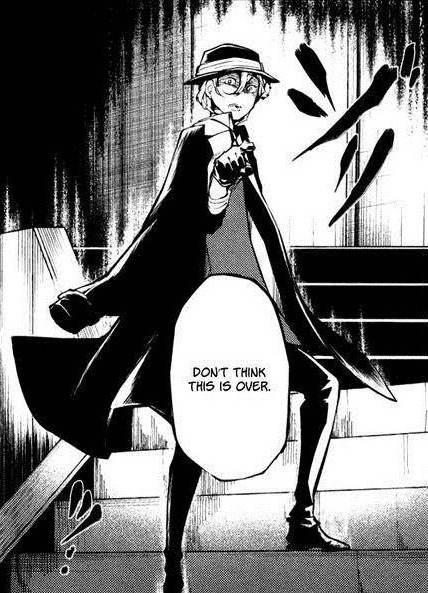
I have many other thoughts about these phrases and this dialogue!
But not today

#bungou stray dogs#bsd#bsd analysis#bsd thoughts#bsd theories#bsd language analysis#fandom analysis#bsd chapter 37#bsd mori#ougai mori#mori ougai#bsd kouyou#bsd koyou#bsd koyo#kouyou ozaki#ozaki kouyou#japanese#translation#bsd manga#manga#bsd mori analysis
46 notes
·
View notes
Note
I love this analysis file very much, but there's one thing I would like to add.
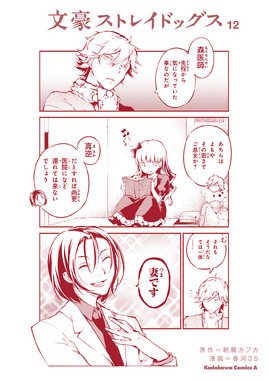


There was one big mistake in the translation and analysis of the poll in the document.
The article was called 「嫁」はNG!? 夫に外で使ってほしくない呼び方は?. It means «Is 嫁 not good [word to use when you speak about your wife]? What are some of your husband's ways of naming you in conversation with other people you don't like?»

On the Japanese site we can see 2 questions.

The first one is “夫に外でどんな風に呼ばれていますか?” “When your husband communicates with others, what does he call you?”
And, yes, tsuma is number 3 here. After 嫁 yome and 奥さん okusan.

The second one was about most hated ways to say “my wife” talking about her with others (according to women's opinion): 「外でこんな風に呼ばれていたら嫌だ」と思う呼び方は何ですか?
Here tsuma is #7, only 5.4% of women don't like it. It's still more hated then name or その他 (it's a bit strange and not common way, Mori wouldn't use it. It means “other person”, but Elise is his part, she's not a stranger) or 奥さん okusan. But 嫁 yome is #5, 12.4% of women hate it.
妻 in Wiktionary:



Now, look:
1) Manga uses the most common and correct words. And rules say, “talking about your wife please use 妻 tsuma. Okusan means someone else's wife, not yours.”
2) Manga language excludes dialect forms of words when it's not a part of the plot. And yome is a dialect word. It's Kansai dialect, but Yokohama is a part of Kanto region. It's different places.
Mori was born in the Chugoku region and lived mostly in Tokyo (it's in the Kanto region). Wikipedia says he probably may have been to Kyoto and Nara a couple times, but that's not significant enough to use the kansai dialect (41st footnote).


3) Also, kanji radicals in 嫁 yome hasn't connection with Elise. She's always with Mori, but 女+家 means “woman”+”home”. She's not a “housewife”. And about tsuma Wiktionary says, “Ideogrammic compound (會意 / 会意): 肀 (“hand grabbing hair”) + 女 (“woman”) ― a man grabbing a woman's hair to show ownership (marriage by capture)”. It was originally about control and Elise as an ability-form is under control.

One of comments about 嫁: 「あくまで私は夫の“妻”なので。“嫁”と呼んでいいのは義父母だけ」(28歳/小売店) A 28-year-old woman working in the store said, “To my husband I'm exclusively 妻 tsuma, his wife. Only my husband's parents may call me 嫁 yome, as daughter-in-law”
「上から目線な感じがする」(26歳/商社・卸)— it's like, "I would feel like I was being looked down upon if I were called that".
「“家にいる女”という印象がして、なんとなく嫌」(25歳/金属・鉄���・化学)— A 25-year-old woman said, "it seems like you've been called «a woman in a someone's house.» It's uncomfortable for some reason".
In bsd Francis (ch. 35 and 44) and the cafe manager (ch. 71) use tsuma talking about their wives. When Louisa talks about Mrs Fitzgerald (ch. 44), she says 奥様 okusama (the most polite form). When Tetcho talks about manager’s wife (ch. 72) he uses 奥さん okusan, simple polite form of “other's wife”.

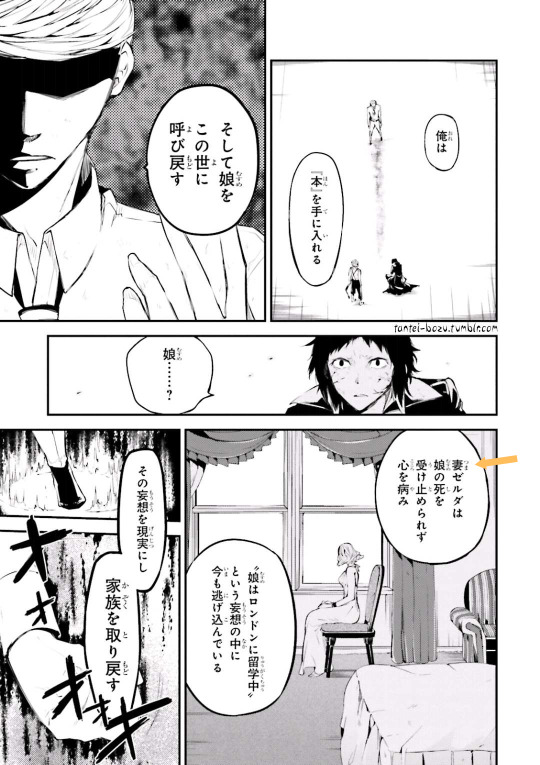



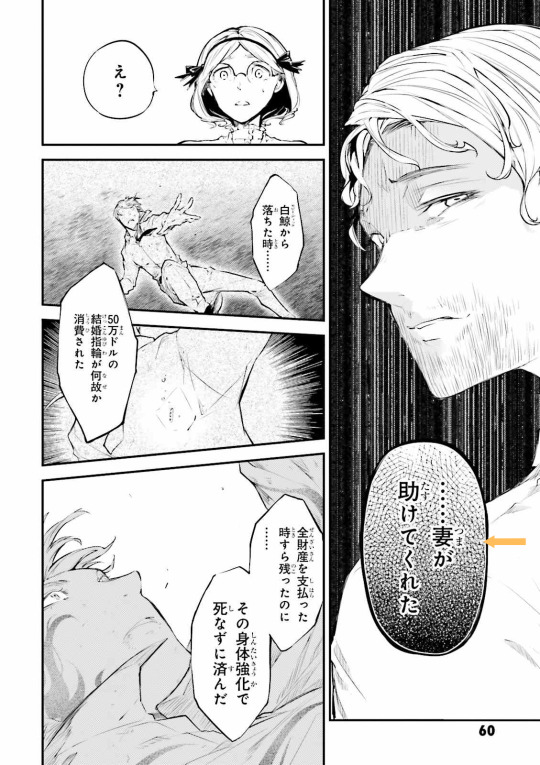
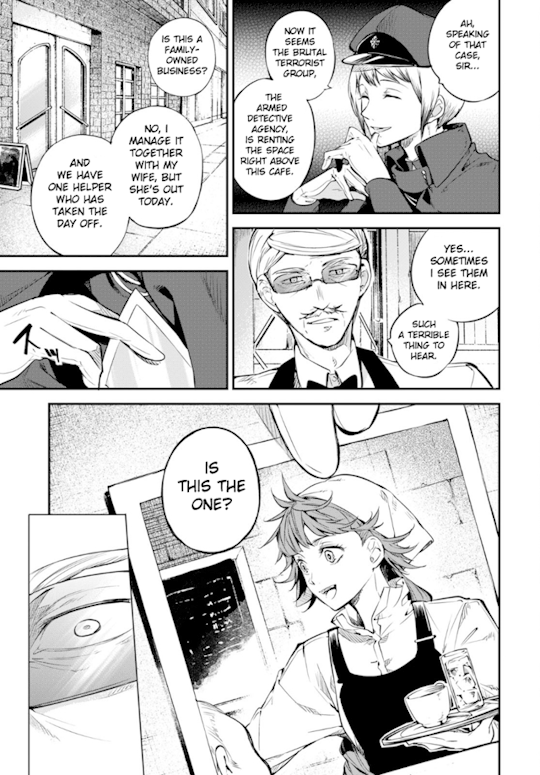
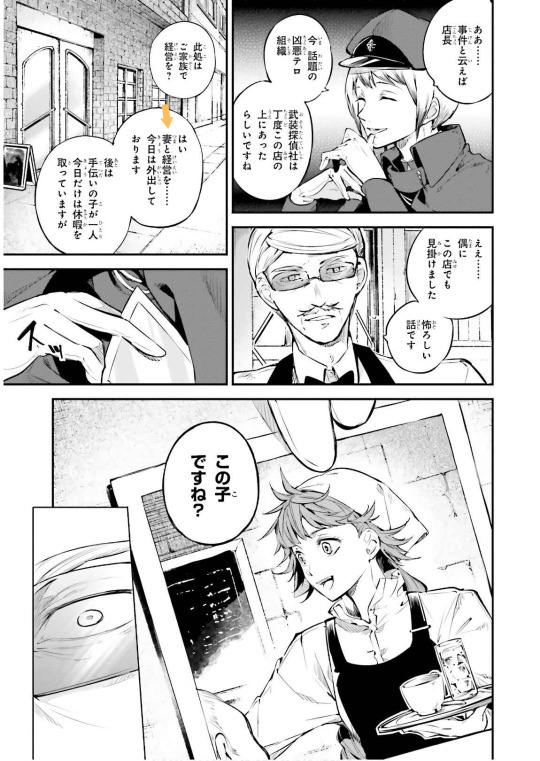

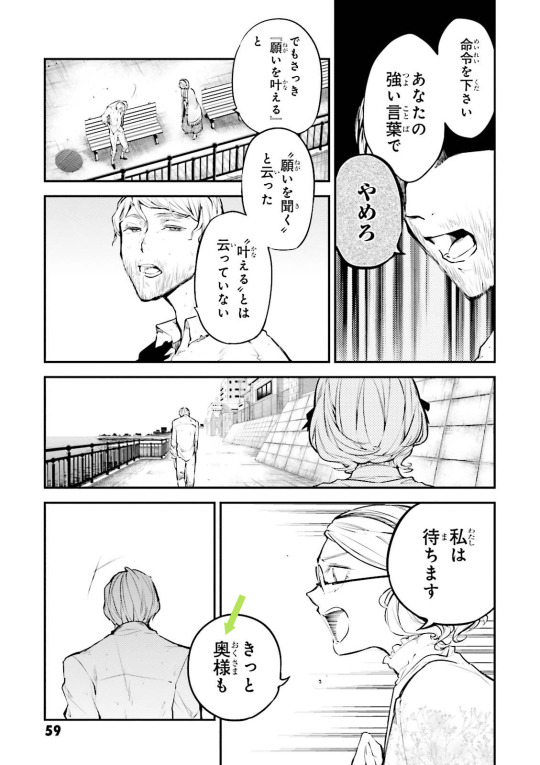
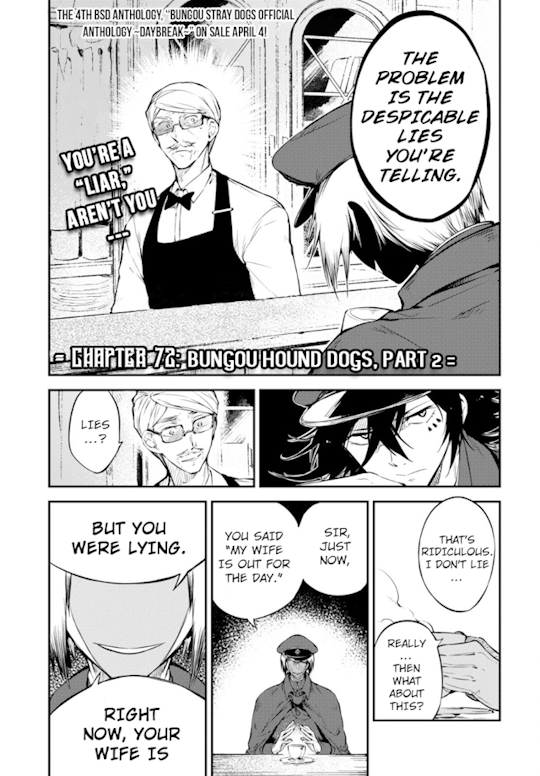
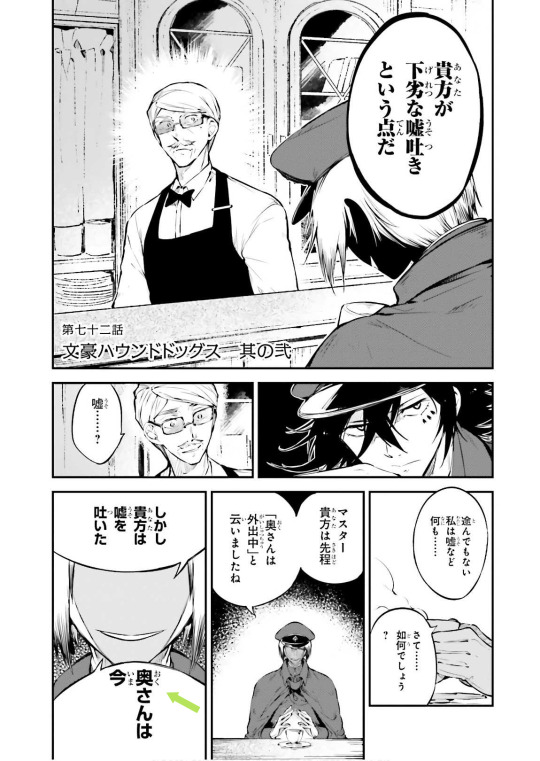
In other mangas 妻 is "my wife", 奥さん and 奥さま (奥様) is "someone else's wife". For example, spy x family (ch. 2) and attack on titan (ch. 88):




Asagiri choose the most popular and correct way to say "wife" ¯\_(ツ)_/¯
But it's not bad) There are many explanations for the use of this word without negative connotation here.
Just like his phrase in his dialog with Kouyou in chapter 37. (Its official translation is the most “censored”, but completely incorrect. [Read more]).
do you think mori is a pedo? (I don't)
BTW CAN I REQUEST YOU TO DO A ANALYSIS? >< anddd if I can COULD YOU DO A VERLAINE ONE?? >0<
Hi there!! :D
Honestly? I don’t either, and this is a surprisingly controversial stance to have, but I really don’t think Mori is a pedo.
I can see why it's a conclusion people come to, and I’m in the middle of an ability analysis on him that explains why I think this better, but the short end of it is that most of what people use as “evidence” of him being a pedo either doesn’t make sense or is a mistranslation. Not to mention Mori is a lying, fickle little fuck (affectionate) and is constantly misrepresenting himself intentionally to manipulate the people around him.
Given that "Vita Sexualis" itself is a work that Ogai Mori allowed critics and audiences to assume was an erotic novel, despite the fact that it's a largely philosophical work that examines sex and it's impact on society, I don't think it's a large jump to think that Asagiri might have taken that into consideration when writing BSD. Not to mention Elise isn't even from "Vita Sexualis", and that is something I definitely see as intentional.
(This is just my opinion and take on his character!)
This essay goes in more detail about some of the aforementioned things for anyone who's interested:
As for requesting an analysis, you absolutely can!! It's a massive compliment to me really, that people actually want to see me unpack certain topics, really got me giggling and kicking my feet here.
I hyperfixated on Rimbaud, and by proxy, Verlaine so I have a TON of thoughts on him already, and he's a character I'm absolutely fascinated by, if you have anything in particular you want me to look into I can totally gear it in a certain direction, or just do an overall breakdown of his character!
Tysm for this ask!! <33
#japanese#japanese language#translation#bungou stray dogs#bsd#проза бродячих псов#бсд#bsd mori#bsd mori ougai#bsd ougai mori#ougai mori#mori bsd#mori ougai#bsd mori analysis#bsd manga#bsd omake#bsd elise#妻#嫁#奥さん#奥様#manga#aot#spy x family#attack on titan#bsd analysis#bsd language analysis
51 notes
·
View notes
Text
Fascinated with the contrast between the (obviously) iconic Corruption Chuuya laugh and the fact that, for almost all of its use time, Chuuya remains neutral to focused/determined during Corruption:

there are actually only 2 panels where he's laughing, notably only after he's defeated his foe, before Dazai steps in:

If you watch the Dead Apple Corruption scene, Chuuya never laughs maniacally, remaining focused the entire time (as his objectives were "defeat the dragon" and "find Dazai" instead of destroying everything around).
On the other side, in Storm Bringer, we see Verlaine laugh while under Brutalization, in the middle of the action when he's already started decimating his enemies (with little resistance). His laugh is described as inhuman and compared to various powerful sounds of destruction.
Still in SB, Chuuya, for his part, smiles his wicked grins when the battle is at its peak with the sharing of blows, but otherwise is only described as howling and yelling (much like he was doing in Dead Apple).
I cannot argue how iconic the mad-with-power laughter of Corruption is, but I find it very interesting how we, the fandom as a whole, have fixated on such a small part of it to the point of assuming the laughter is a constant presence.
#i haven't gone insane over details in a while#my new beast is chuuya body language in the manga#i'm collecting some pictures as very scientific (coughs) research#bsd#bungou stray dogs#bsd chuuya#bsd nakahara chuuya#apparently i talk sometimes#bsd analysis
1K notes
·
View notes
Text
dazai is good at eating pussy because of experience, hypermobility, and low self esteem. akutagawa is good at eating pussy because of ten percent luck, twenty percent skill, fifteen percent concentrated power of will, five percent pleasure, fifty percent pain, and a hundred percent reason to remember the name. and low self esteem.
#bsd dazai#bsd akutagawa#bsd#ty fort minor for the language required to conduct meaningful bsd akutagawa character analysis
61 notes
·
View notes
Text

The person who give me a reason to live
I can't stop thinking abt the parallels between Teruko and Yosano 😭Hurt me to think, both were just a little girls, Yosano was 11 and Teruko is 12. Both were used as a weapon because of their abilities and they saw the worst side of the war no, I don't think war have any good side it's really heartbreaking.
However, they followed different paths after meeting a person who literally gave them a reason to live: Fukuzawa and Fukuchi in the Yosano's case, Rampo was there too
This duo also followed different paths, showing different visions abt the world. Fukuzawa didn't go to war, Fukuchi did. The first saved Yosano and gave her a place that didn't need her ability, just her kindness: the Armed Detective Agency. The second saved Teruko too and she joined the Hunting Dogs but don't forget, all of them are weapon and their bodies were surgically altered to result in superhuman abilities.
I'm not judging who was right or wrong abt this situation, but again, Yosano and Teruko were kids, KIDS IN FRONT OF WAR. PLEASE ASAGIRI DON'T HURT ANY CHILD ANYMORE
#sorry not including Rampo :')#he's also an important character in Yosano's development#but i tried to focus only Fukuzawa and Fukuchi#art + analysis#first time doing this :)#english isnt my first language#so im sorry if there any mistake#bungou stray dogs#bsd spoilers#bsd 115#bsd fanart#yosano akiko#teruko okura#armed detective agency#hunting dogs bsd#bsd fukuzawa#bsd fukuchi#bsd analysis#fanart
160 notes
·
View notes
Text
Maybe I'm just really dumb for only realising this now, but I was finally reading BSD and I noticed something that I have never seen anyone talking about, but I belive it to be important
Has anyone else notice that when we learn about Ranpo and the creation of the ADA, wich happend like 12 years ago, it all had to do with a group that was referred to as V, wich initially we thought it meant the letter, but later we found out it actually refered to the number 5 in roman algorithms. The thing is, in the more recents events, turns out that the group V was the same as the Decay of Angels, and here lies the problem
As we know, the five members of de DOA are Fyodor, Nikolai, Fukuchi, Bram and Sigma, who was created by the book only 3 years prior to the events of BSD
So, basically, the events of 12 years ago the we are shown, that mentions all the five members of DOA, are already an altered reality by the book (we've already seen that if someone writes something in the book, the people involved and affected by said events have their memories altered to fit the narrative)
Ranpo backstory is an altered piece of reality caused by the creation of Sigma through the book. And we don't know if there was anything else that we've read that is an altered reality as well!!
#bsd#bungou stray dogs#bsd sigma#ranpo edogawa#armed detective agency#decay of angels#bsd spoilers#bsd manga#bsd analysis#bungo stray dogs#sorry if this doesnt make sense#english is not my first language
81 notes
·
View notes
Text
FYOZAI ANALYSIS
Heya bsd fandom! Welcome to my fyozai analysis that no one asked for. If you're an anti, please feel free to skip this post, I'm not a fan of shipping war. If you're not caught up to the manga and don't want to get spoiled, you can also skip because this contains manga spoilers.
Now, I want to say in advance that I have nothing against other zai and fyo ships (I like skk — I even edit them — and fyolai — thanks to Creantzy), I'm merely stating things as I see it. And if you agree with me, then we have something in common.
Background
Their similarities and differences
Their relationship
They hate each other vs. it's nothing personal
Their view of each other
How they treat each other vs. how they treat others
Why is fyozai a good ship?
How they feel about one another
fyozai is NOT skk 4.0 or fyolai in a different flavor
Their connection
Their abilities
Background
In chapter 37, after the fall of Moby Dick and before Dead Apple, Dazai told Hirotsu that he met Fyodor before the present timeline, and he also hinted that he knew Atsushi is the tiger from the very start. It's a popular headcanon that they met after Dazai left the Port Mafia, but until today, we still don't know how they met and their circumstances at that time.
I'm assuming it will be revealed in the coming chapters before Fyodor is defeated to make us cry, maybe from Sigma's POV, or Asagiri-sensei will release a new LN. (It's also possible Asagiri-sensei will leave it at that for us to do what we want in fanfiction.) Either way, it's clear that they got to know each other pretty well during that time, since Dazai is already familiar with Fyodor and his ways even before they reunited again.
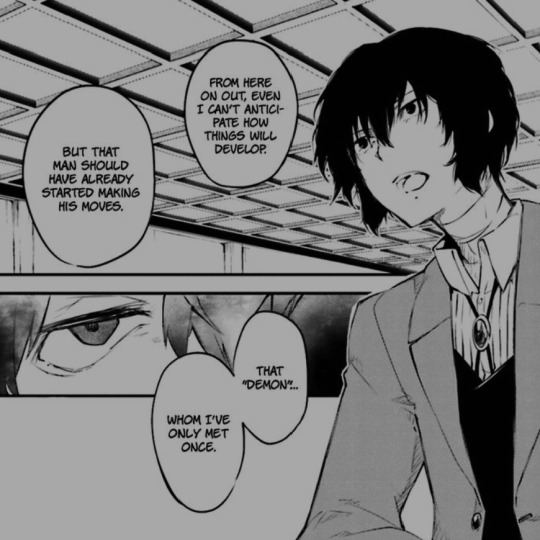
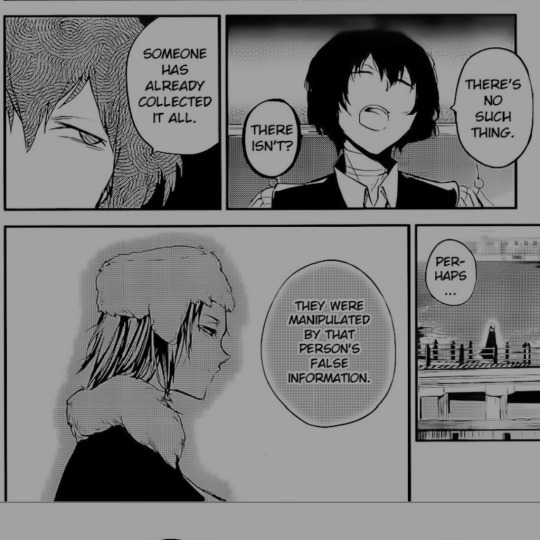
Speaking of reunion, there's a detail that wasn't specified in the Dead Apple — in the movie, at least. I haven't read the manga or LN — but supposedly, Dazai teamed up with Fyodor against Shibusawa, but Fyodor was pals with Shibusawa and sold Dazai for his ability only for Fyodor to also betray Shibusawa. In short, it's a circus of clowns and demons.
Anyway, this means that Dazai had a way of reaching out to Fyodor to be able to team up with him beforehand. Of course, that went up in flames during the cannibalism arc. (It'll be hilarious if Dazai casually called Fyodor to ask him where he is and Fyodor hung up on him though.)
Moving on to communication, the two of them talked to each other enough to create their own language. And by enough, I mean a lot, they must've had a lengthy conversation during the DA and before that. Otherwise, how the fuck can they use a lot of words in prison? Because their meetings during the cannibalism arc and their on-screen time in the movie sure as hell wasn't enough to make up their language.
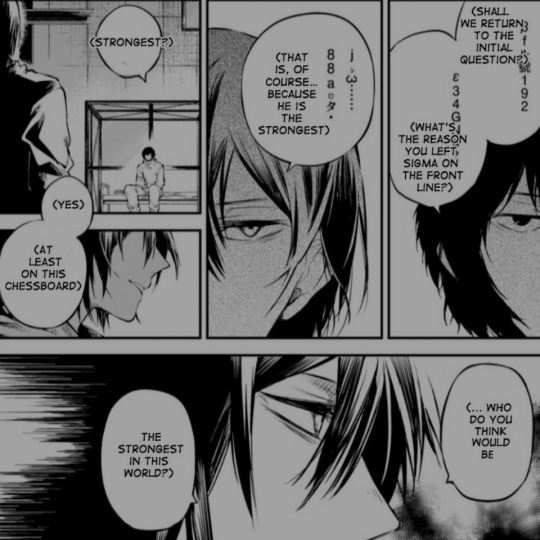
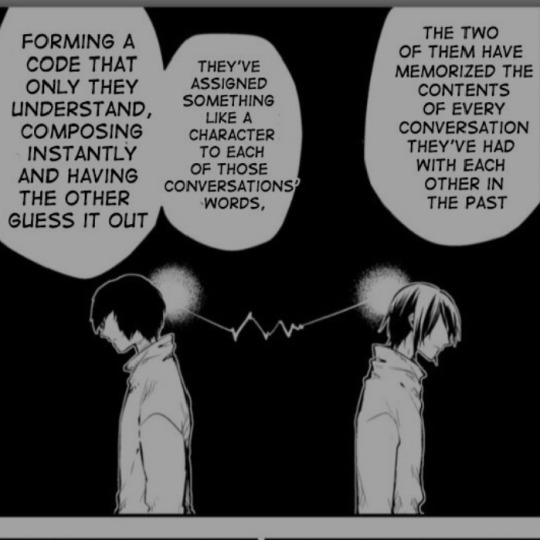
We don't know enough about their personal background yet and their history together is still up in the air so we'll leave it at that.
Their similarities and differences
Dazai and Fyodor are so similar. That's established since their first interaction in the main manga. They are both highly intellectual geniuses who feel alienated from society. Dazai feeling alienated? Not a shocker if you've read his ability and it's shown in the 15 arc. (i.e. him shooting that guy from GSS over and over, and going “ah right, that's the right way to think" after Chuuya stopped him.) But Fyodor? Well, yes. It was practically stated by Ango during the DA and confirmed by Fyodor with his iconic counseling hour bit. That panel is not just for fun and giggles. It's Fyodor admitting that no one can quite understand him. Just as they can't understand Dazai.
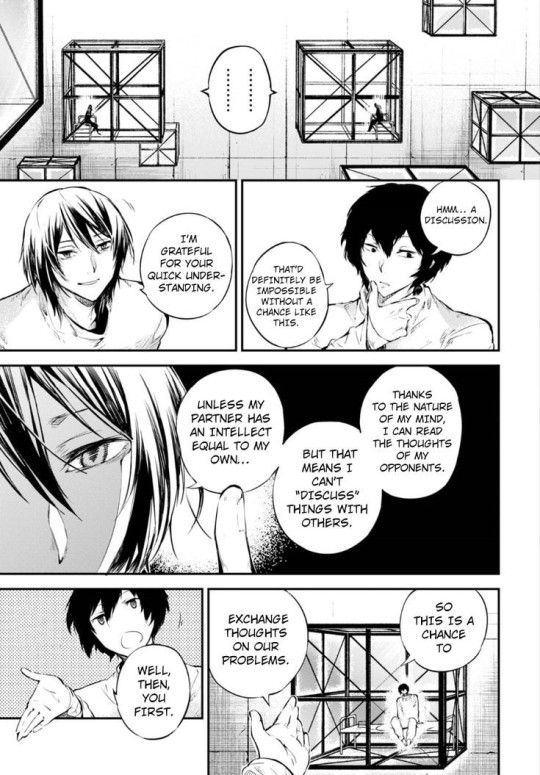
They view themselves as being different from the rest of society; Dazai views himself as being below the other humans, and Fyodor views himself as being above and closer to God.
Both are also willing to go to great lengths to achieve their goals. Getting captured, killing, manipulation, using people, betraying allies, the list goes on and on. As they said in the alley, they are alike. And that's the reason they are each other's worst enemy. They are not yin and yang like Akutagawa and Atsushi, no, they are the opposite sides of the same coin. The reason why it's opposite? Well, aside from them being on opposing side of the war, it's because of their one difference.
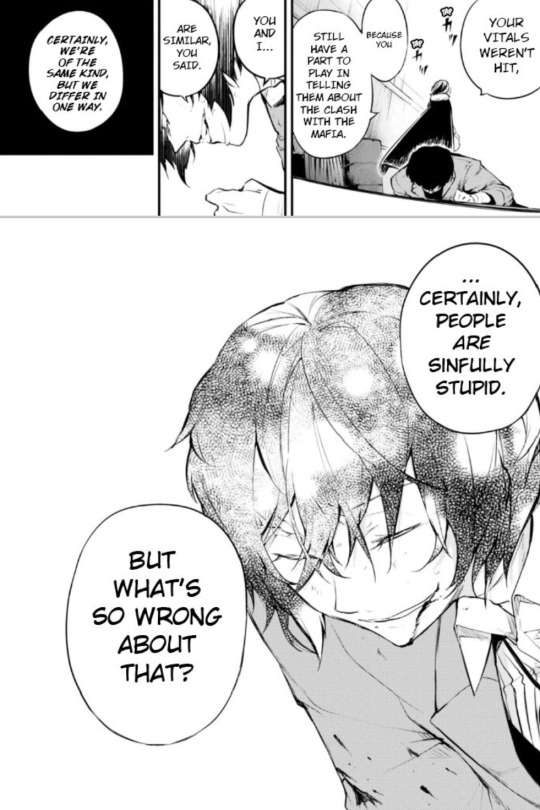
Dazai found beauty in people being sinfully stupid while Fyodor despised it. Fyodor wants to cleanse that sin, but Dazai accepts it as part of people's humanity. But you know what's interesting?
“He is stupid. I am not disputing that, but perhaps the normal man should be stupid, how do you know? Perhaps it is very beautiful, in fact.” — Notes From The Underground
This is a line from one of IRL Fyodor's novels. I think that their conversation about stupidity comes from this. Who knows? Maybe Fyodor will have a change of heart in the end.
Their relationship
-They hate each other vs. it's nothing personal
I think it's clear by now that Dazai and Fyodor don't hate each other. There's nothing personal in their fights. It's Dazai wanting to fulfill Oda's last words and doing his job for the ADA, Fyodor is an enemy so he has to dispose of him. It's Fyodor wanting to achieve his goal, but Dazai is in his way so he has to eliminate him. They are rivals, sure, but they don't have the animosity sskk used to have.
It's all business. If Fyodor ever becomes like Verlaine, I doubt that Dazai will still kill him without a reason. If Dazai ever joins Fyodor's side, I don't think Fyodor will kill him either unless given a reason.
In fact, it looks like Fyodor doesn't even want to kill Dazai. Before you guys call me delusional, bear with me and read until the end, it will make sense. Of course, this is all speculation on my part.
In the Dead Apple, before Dazai merged with the dragon, Fyodor could have stopped him by dragging him down before he's high enough. Or he could stab him lethally to make sure he's dead and not rely on Shibusawa's poison. But he didn't. Fyodor just let everything play out as though he's testing Dazai. (And for entertainment)
In the alley scene, Fyodor knew Dazai would come for him and he ordered the sniper not to hit Dazai anywhere vital, but he didn't have to do that. Fyodor rationalized his action by saying that Dazai still had to tell the Armed Detective Agency about the fight against the Mafia. Did he need Dazai specifically to be his messenger though? He sent the Port Mafia a letter! Can't he do that for the ADA? Fyodor could have ordered his sniper to kill Dazai (Dazai still came anyway even knowing there's a sniper, he's suicidal like that lol or maybe he just knew Fyodor wouldn't kill him) and order someone to give the Agency the letter, but he didn't do that. Basically, they just exchanged information and Fyodor got Dazai out of the way, albeit temporarily, without killing him.
And then there's Meursault. Mushitaro said that Fyodor let himself get captured, although he looked genuinely shocked when Dazai caught him, and that may be because Dazai getting arrested was already planned from the moment Fyodor recruited Mushitaro.
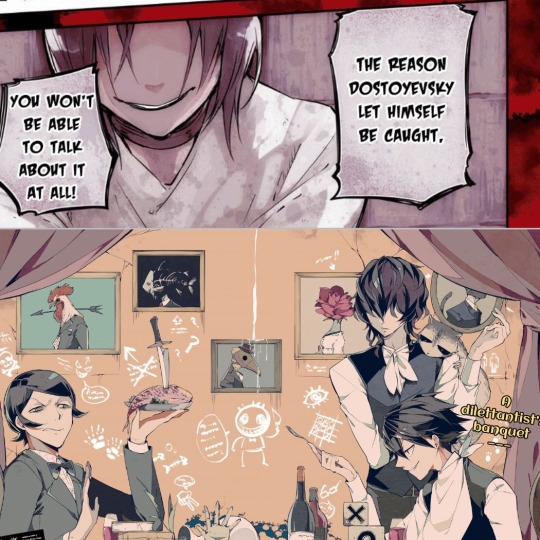
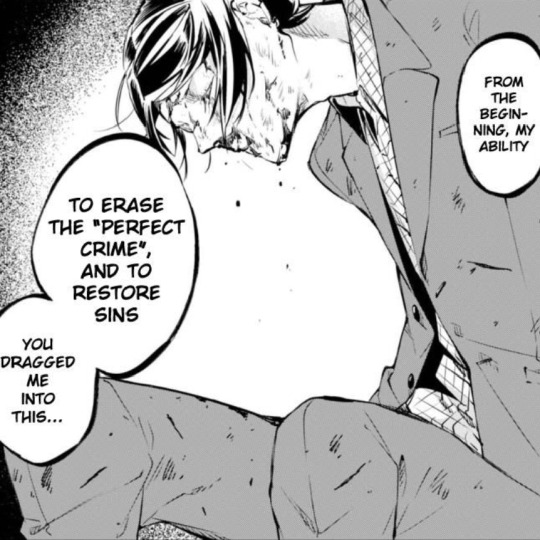
Once again, getting Dazai out of the way without killing him, Fyodor planned to send him away from Yokohama. And so Dazai also let Jouno arrest him in order to get closer to Fyodor. But then, Nikolai came into the picture and started the prison break.
Now, if Fyodor really doesn't want to kill Dazai, then for what reason? It's simple. He wants Dazai to be his other half. And when he deemed Dazai unfit for it, after the whole prison break, he went to Atsushi.
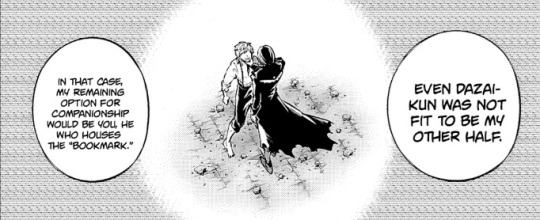
-Their view of each other
Earlier, I mentioned how they view themselves, now it's how they view each other. Fyodor put Dazai on a pedestal and vice versa. Why? Because they view themselves as being different from the rest of society, but as the two outcasts who share a mutual understanding, they see each other as being the same kind. They said it time and again throughout the manga.
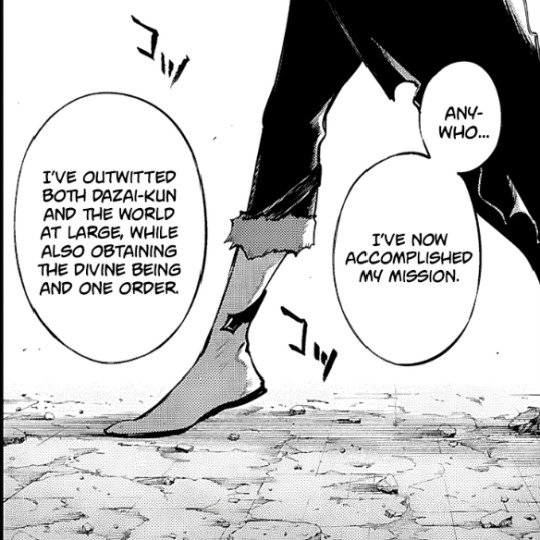
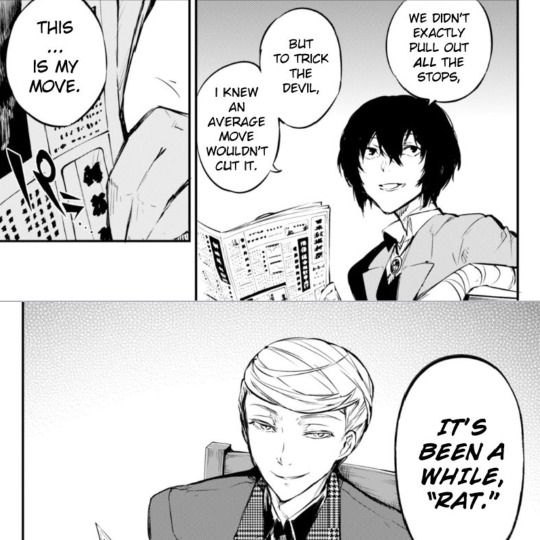
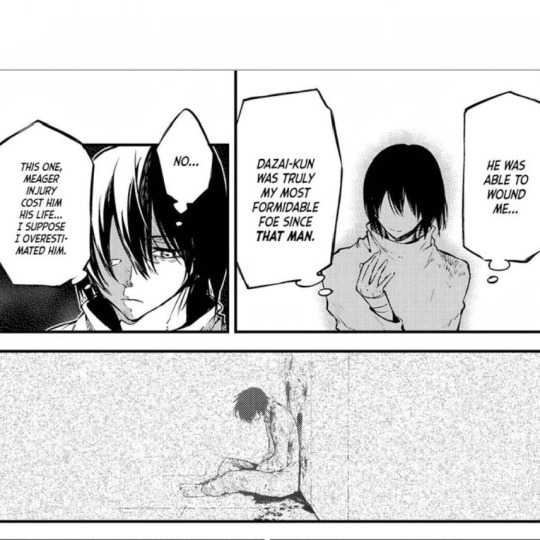
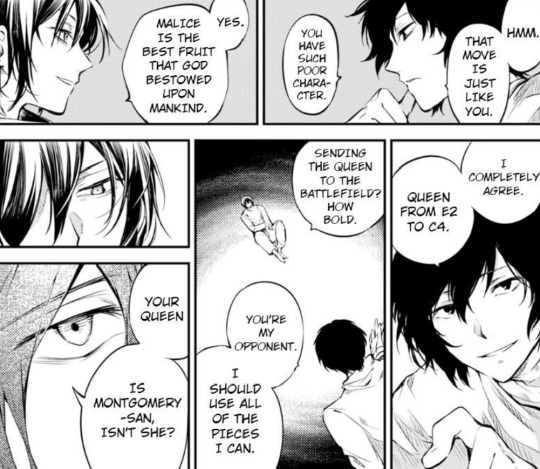
It's more apparent with Fyodor singling Dazai out of the world, but Dazai also regards him highly out of his every other enemy, because Fyodor is someone who can match him. Dazai's actively putting in effort and using everything he can (government, Port Mafia, The Guild, and even Sigma) to defeat Fyodor. They view each other as equals and don't treat each other as mere pawns. And that leads me to this next point.
-How they treat each other vs. how they treat others
Dazai treats Fyodor differently from the others. ie. Kunikida, Chuuya, Sigma, and Ango
Dazai has a habit of annoying his partners, withholding information, and manipulating them. He does it to Chuuya, Kunikida, and later on Sigma who he admits is a replacement for Kunikida. It's called the Dazai effect.
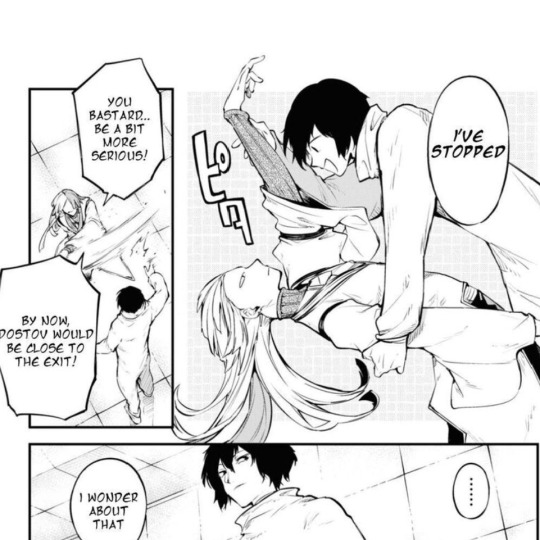
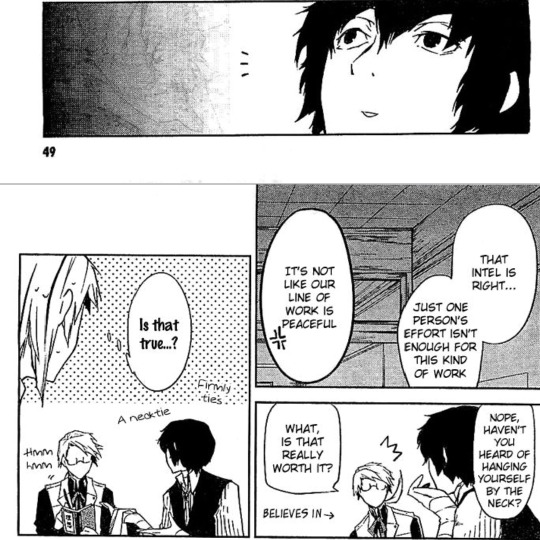
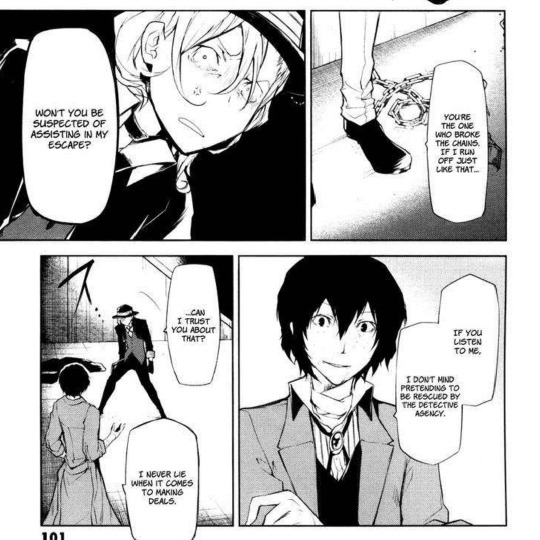

But he couldn't do that with Fyodor. Why? Because Fyodor is calm and rational like him, Dazai wouldn't be able to easily manipulate him. First, Fyodor wouldn't yell and punch him. Second, Fyodor would guess what information he's withholding rather than wait to be amazed or mad by it. That's literally their whole shtick. They would guess and anticipate the other's plan until they got surprised and then repeat. And third, unlike the rest who will still trust Dazai and even put their lives on the line for the sake of his plan, Dazai won't be able to just simply utilize Fyodor, as proven in the Dead Apple when Fyodor turned on him.
That's not to say fyozai don't get silly though. The prison arc is enough proof that they can. Their silliness is just on another level that others couldn't reach or understand. So to speak, Dazai is both more mature and childish when dealing with Fyodor. He's more natural and not putting on a happy-go-lucky mask.
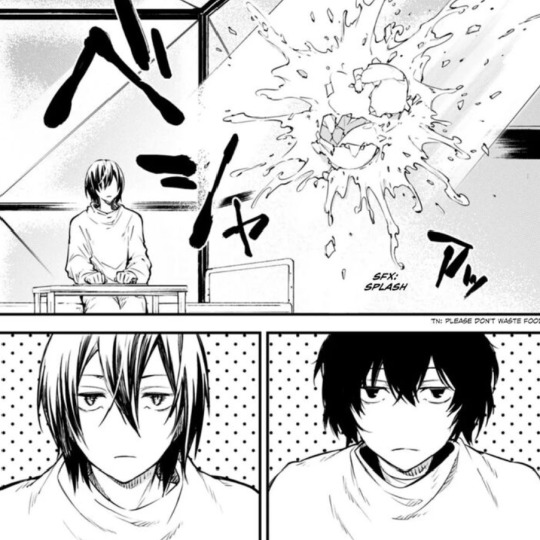
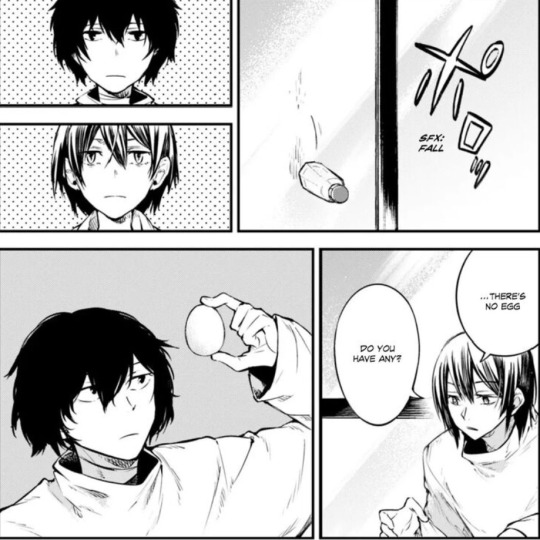
Then there's Ango. Though he's not usually ship with Dazai, Ango and Fyodor have one similarity, that is that they both have a history with Dazai in the past. Unlike with Fyodor, we already knew what happened between Ango and Dazai, and even when they started talking again their friendship wasn't quite mended. What's interesting to compare here is their reunion. With Ango (and Mori in extension), we can still see a hint of hostility from Dazai, but there's none of that during the Dead Apple or the alley scene during the cannibalism arc with Fyodor. They're casual with each other. What can we take from that? That their previous meeting didn't end on a particularly bad note to warrant a resentment from Dazai.
Fyodor also treats Dazai differently from the others ie. Nikolai, Ivan, Shibusawa, Fukuzawa
Like Dazai, Fyodor is manipulative towards the people around him, whether they're allies or not. Fyodor always has control over the others, and as Dazai said, he can't trust those he cannot control, and that's why Fyodor has no real allies (compared to Dazai), they're just pawns for him to control. He manipulated everyone who ever got close to him (Shibusawa, Ivan, Nikolai, Fukuchi — to name a few) but there's an exception to that, because just as Dazai couldn't easily manipulate Fyodor, Fyodor also couldn't easily manipulate Dazai. And it works so well in their dynamic.
Now, on to his enemies. Fyodor has shown a lack of interest in his enemies, even the president of the ADA which is where Dazai currently belongs to, with the exception of Dazai and Atsushi. Although, Fyodor's interest in Atsushi has less to do with Atsushi himself, but to him being a bookmark, and that's what makes Atsushi and Dazai different. Because Dazai is not the bookmark, what makes him any different from Fukuzawa, who by all rights based on hierarchy should be the bigger fish? It's that Fyodor put Dazai on a pedestal. This also further proves my earlier claim of how they view each other.
Fyodor now thought that Dazai isn't fit to be his other half, but what happened when he went to Atsushi?
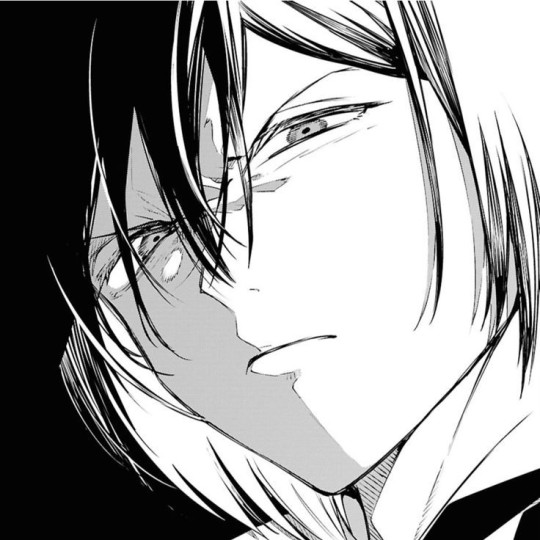
He's dissatisfied and disappointed because Atsushi didn't live up to his expectations and went on yapping about Dazai. And what can we take from that? It's that Fyodor wants Atsushi to surpass the standard Dazai set, especially since he houses the bookmark, to be his other half.
Why is fyozai a good ship?
-How they feel about one another
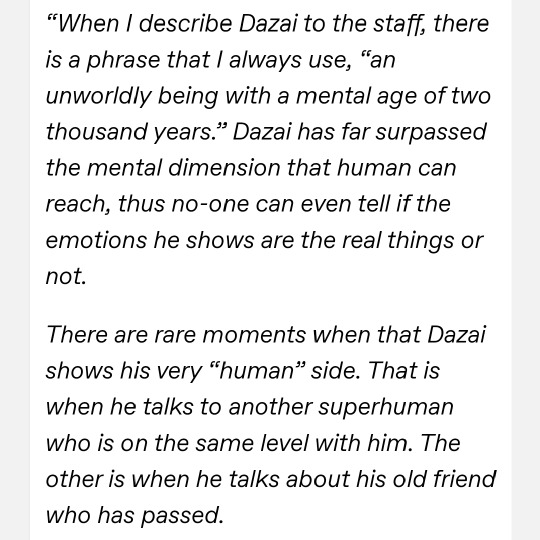
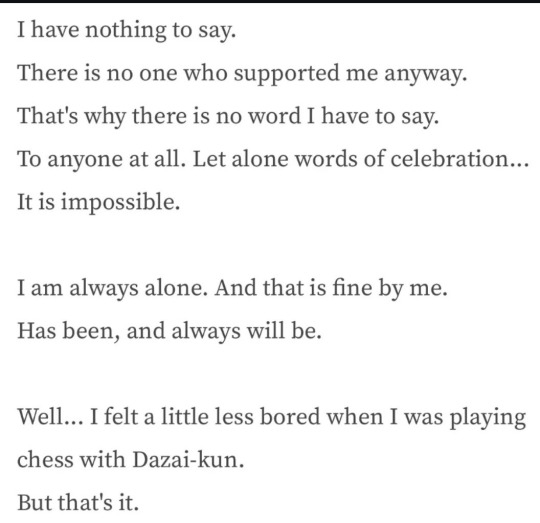
Do I need to say more? Really? Is that not good enough evidences?
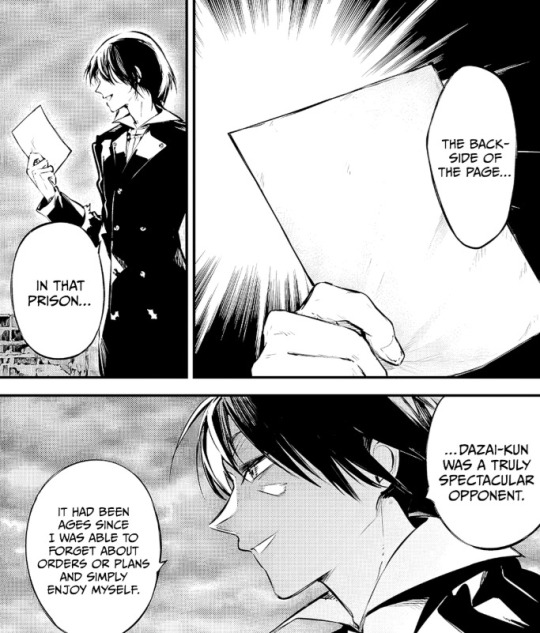
Sounds familiar? If you're an MTP fan, it does. Fyozai is like a darker and doomed Sherliam.
-fyozai is NOT skk 4.0 or fyolai in a different flavor
As I stated above in their relationship, Fyozai is different from the rest of the ships. Of course, every ship has their own uniqueness to them. Soukoku with their unbreakable trust, Kunizai with their differing sense of justice and morality, Sigzai with their damsel in distress and knight in a criminal uniform, Dazaku with their codependency, Fyolai with their Judas theme, Shibufyo with their ghost bride shit etc etc. But the thing is, Fyodor and Dazai both treat each other differently than when they're with the rest. Dazai isn't constantly messing with Fyodor and Fyodor isn't controlling Dazai's moves. They stood on equal ground and planned each other’s downfall.
Also, Fyodor wants a challenge. Simply put, he's sick and tired of his monotonous life. Dazai's someone who can give him that and in return Fyodor can give Dazai a challenge to live for.
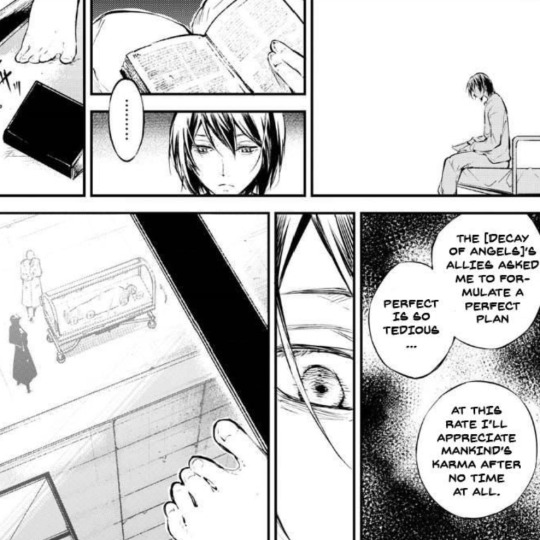
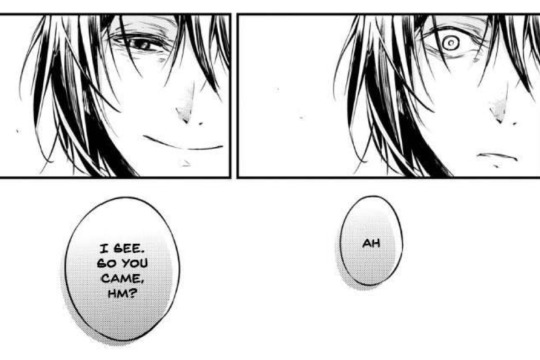
He smiled when he saw Dazai in prison!
Now, some might say “but they're toxic!" All of their respective ships are toxic tbh, but fyozai is actually good for each other because they bring out their humanity together, and like I stated above, they're both manipulators who can't manipulate each other easily. “But they tried to kill each other!" And so did the others. It's out of necessity and not because they hate each other. There is a reason why their ship is enemies and lovers duh.
-Their connection
Everyone likes to say that SKK understands each other, and while I admit that SKK matches each other perfectly (there's a reason why it's the most popular ship in the fandom), I hate to break it to you but fyozai is the one who truly understands each other. They relate to each other at a much deeper level; in their alienation from society, their shared intelligence, morality, and humanity.
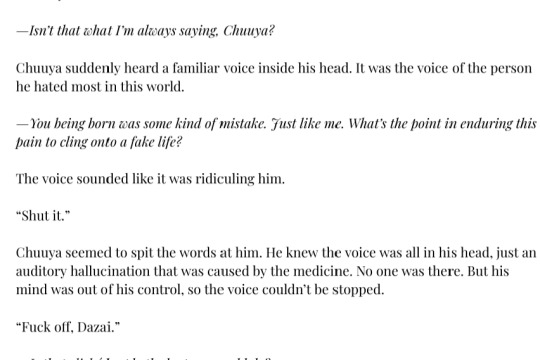
“Living itself is the source of sin." — No Longer Human
This is a prime example of that. In Stormbringer, Chuuya hallucinated Dazai, and that Dazai was naturally created from his view of him in his mind. However, Chuuya didn't think the same way as Dazai and didn't agree with him, like he later on said. But you know who does?
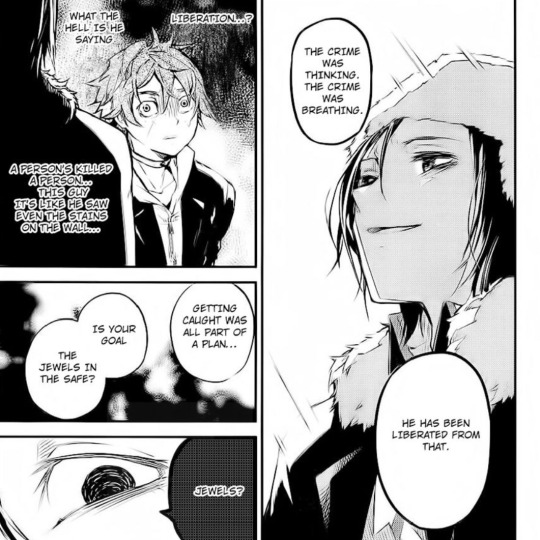
Yes, everybody. It's your host Fyodor Dostoevsky!
“Dazai doesn't give a fuck about Fyodor!" you might say. But this point is still debatable due to a lack of POV from Dazai's side. However…
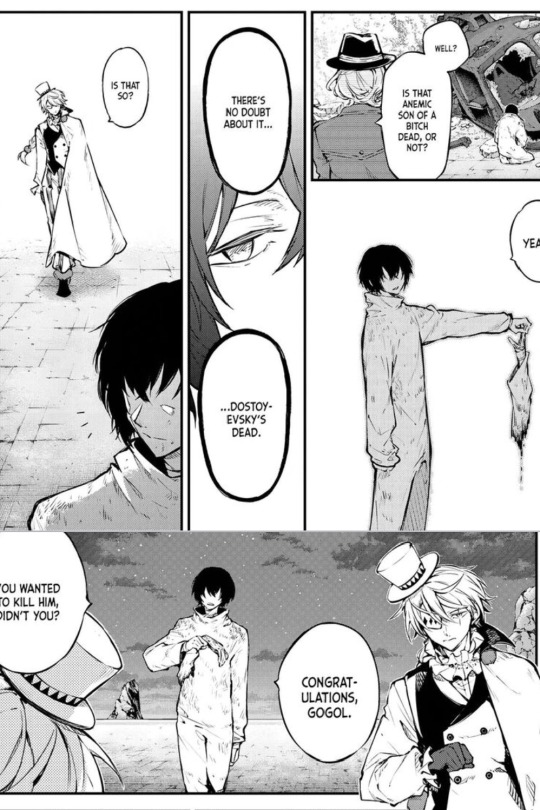
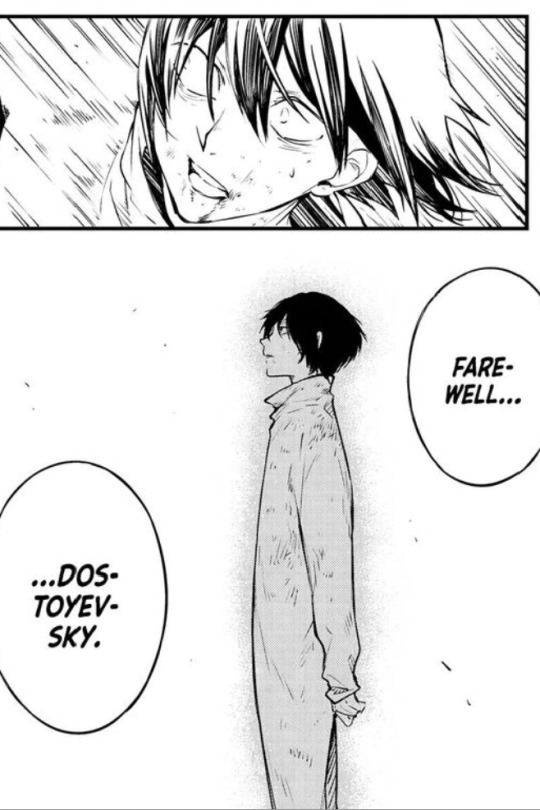
Dazai didn't look happy when Fyodor died. Like, his smile disappeared as soon as the helicopter moved, and then his expression went blank. Even his eye seem empty.
Then, if we based Dazai to Yozo from NLH, then he's someone who cannot love someone he cannot relate to. That's why he claims to hate Chuuya. Because Chuuya is so human.

Even if Dazai and Fyodor didn't spend years together, it's undeniable that they have a strong connection with each other. And that connection is also related to their abilities.
-Their abilities
No Longer Human
-Nullifies any ability with a touch
*Crime and Punishment
- The crime is killing Fyodor and the punishment is Fyodor taking over the killer's body
-In DA, Fyodor claims that he is Crime and his ability is Punishment, working side by side, however, in NLH Dazai supposes that Crime and Punishment are not synonymous, but antonymous. How will that work? We will put No Longer Human into the equation.
Punishment is not the result of crime, but the opposite of it. Fyodor's crime is living a long life as a consequence of the sin that's his ability, and so his punishment is death that can be granted by No Longer Human, releasing him from sin. However, there's another question that arises here. If death is not the opposite of life, but a part of it — the last part, the first part being birth — then what's the opposite of life? Well, I still don't have the answer to that other than non-existence. And if Fyodor dies he will cease to exist. Idk if I'm making sense. But that's it.
It's also possible that Fyodor wants Dazai to kill him in order for him to be at peace (aside from Atsushi who can tear through abilities with his claws, Dazai is the only one who can possibly kill Fyodor) and that may be part of the other half thing. It doesn't seem like Atsushi will kill Fyodor since from what we've seen they're still fighting the higher being two hours later. Unless, the higher being can move independently even if Fyodor's dead.
And Dazai will see that as courting! (Mentioned in the Dark Era about Gide 'courting' Oda) Also, Dazai started talking about double suicide after Oda died, so maybe he really doesn't want to die alone because it's lonely. If that's the case then a double suicide with Fyodor will satisfy the both of them.
And that's enough yapping from me. I won't call Fyozai underrated, but it definitely deserves more love and appreciation. I just wish that I did them justice with this analysis.
54 notes
·
View notes
Text
M A S T E R L I S T
D A Z A I O S A M U
BSD Dazai x ideal type fem!reader



headcanons (detailed)
DAZAI’S IDEAL TYPE
MILD N*FW HEADCANONS coming soon

scenarios
A SWEET MOMENT (Dazai wants your attention)
JEALOUS DAZAI (“You know other men, bella?~”)
A LOVE FORGOTTEN (Kitsune Dazai x fem!reader)
DESPERATE (Dazai x yandere fem!reader)
BSD MEN x first date (Dazai included)

analysis
DAZAI’S IDEAL TYPE
DAZAI x CHUUYA DYNAMIC ANALYSIS
THE DAZAI x ATSUSHI DYNAMIC
DAZAI ANALYSIS [x relationship with darling]
BSD MEN and their MBTI types
Would DAZAI cheat on his darling?

imagine with me
DAZAI PROVOKING HIS GIRLFRIEND
DAZAI IS “THAT” MAFIA LOVER

extras
BSD MEN x Disney Princesses (Dazai included)
BSD MEN x attachment styles (Dazai included)
BSD MEN x love languages (Dazai included)
BSD MEN x their first time meeting their darlings (Dazai included)
Why do I like Dazai so much?
Dazai’s ideal type is similar to Fyodor’s ideal type
Odasaku’s regret
“FIXING” DAZAI
DAZAI & THE BOOK
BSD MEN PLAYLISTS (Dazai included)
BSD MEN as Lana Del Rey songs
Random things BSD MEN would say about you / to you (Dazai included)
BSD Men with a Darling Who Writes NSFW Content
BSD MEN sleeping positions with their darlings

more to come…
(requests are currently closed, reblogs, likes and comments are most appreciated🩵)


#bsd dazai#bungou stray dogs dazai#dazai x you#dazai x reader#dazai osamu#bungo stray dogs#bungo stray dogs x reader#bungo stray dogs dazai#yandere bsd#yandere dazai#bsd#bsd smut#bsd analysis
128 notes
·
View notes
Text
📎 YOSANO AKIKO ANALYSIS
UNDERSTANDING & ANALYZING BUNGOU STRAY DOGS YOSANO THROUGH THE LENSES OF THE REAL YOSANO AKIKO'S LIFE
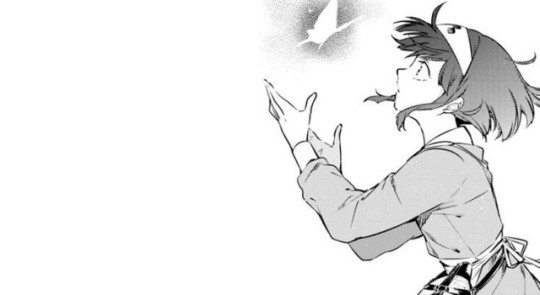
WC. 4,000
DISCLAIMER: I am no historian or literary expert I am just obsessed and mentally unwell, if u cannot tell, teehee <333 If this will ignite any hate or hostility (not this post’s intention), please set your sights elsewhere and just scroll. I made this because I love her character and BSD in general to a bone-shattering degree. I hope you have as much fun as I did while researching and writing this, enjoy!! (also English is not my first language forgive me for any grammatical errors ty)
There might be a part two for this, but for now, this is all my tiny brain could offer >:))
IMPORTANT NOTE: There will be a lot of omitted, summarized information that has been subjectively extracted or abridged. This is not a complete, rich historical account but research done to make connections and parallels to better understand and theorize about BSD Yosano’s character. I did not finish reading the entire biography, which is why this is only the first section of a bigger whole.
However, if you desire to dig deeper about her in an unabridged manner please kindly refer to the source I will list below. One last thing, please don’t hesitate to add your own thoughts, I am encouraging you to do so, I will appreciate it so much actually!
My primary source;; Janine Beichman - Embracing the Firebird_ Yosano Akiko and the Birth of the Female Voice in Modern Japanese Poetry-University of Hawaii Press (2002). [pdf can be downloaded for free @/libgen]
Allow me to initiate this observation with a passage directly extracted from her biography (the one named above):
“Yosano’s father Òtori Sòshichi (1847–1903), was the second-generation owner of the Surugaya, a well-known confectioner that specialized in yòkan (sweet bean paste) and sweet dumplings.”
With this passage in mind, I’d like to remind you of this scene in the manga that hinted at BSD Yosano’s circumstances and background prior to being selected as Mori’s assistant at the fortress. In this panel, she mentioned that she was tending to a candy store before getting drafted.

Now, drawing from the passage we read regarding the real Yosano Akiko and applying this to BSD Yosano—it’s not far-fetched to assume that the candy shop she was tending to was run and owned by her family. Normally, we could say that familial separation, especially at such an early stage of childhood would be quite hard on the child. However, if we consider the following facts from the real Yosano Akiko’s childhood and parallel it to BSD Yosano again, we could conclude that the separation wasn’t as difficult nor emotional for her when Mori selected her, because she was called in this book an ‘infant exile.’
Starting from the very birth of the real Yosano, her father was severely appalled by her because she was a girl. Moreover, he deserted their home for a week without even looking at his daughter’s face. Her mother became distressed because of the week-long absence of her father, (fainted, even) and couldn’t breastfeed her properly, resulting in the infant Yosano being sent to a maternal aunt accompanied by a wet nurse.
Two years later, due to convenience rather than the will to come back, Yosano returned to her familial house because her aunt had a new baby of her own to look after and raise. Though at this time, a new baby was born, too, at the Otoris. And this baby grew up to be the brother to whom the adult Yosano dedicated her poem ‘Thou Shalt Not Die.’
Since the arrival of this baby boy, Yosano’s existence has become easier to tolerate—see this actual snapshot from the passage I am referencing:
‘ while at the Òtori home a baby boy had finally arrived, making it easier to tolerate the unwelcome girl.’
As if to rub in the author’s title for the real Yosano Akiko (infant exile) even their servants and relatives had a distaste for her and her personality, viewing her as the ‘difficult’ child in the family. Here’s another direct quote from the biography book:
‘The relatives chimed in disapprovingly: “‘The younger brother is better behaved; his older sister is a little much.’ From the apprentices to the little uncle on my mother’s side all predicted better things for my younger brother than for me. Having to listen to all that didn’t feel very good.” Even the servants rubbed it in.’
Additionally, Yosano Akiko herself wrote that she never knew the warmth of a mother or father’s lap and that her parents had an inherent antipathy towards her that was not inflicted on her siblings. She wrote, that other women are troubled concerning their in-laws, and how to operate as human beings alongside them but this same worry is her very reality in her own family’s household—blood and flesh—she served her parents as if they were her in-laws and endured hardships by their hand and in their name. Here’s a snippet from the biography:
‘“Other women become brides and struggle to manage a household, but for me it was the reverse: from the time I was a young girl I served my parents as if they were my in-laws, and endured emotional and physical hardships.”’
Another possible factor that enriched an equal sentiment of apathy within Yosano was despite the extremely young age of three she was coerced into attending school—which, as made clear in the biography, was something she disliked. What gave her parents this idea? Well, her father was quite the ardent enthusiast of the science of producing superior human beings. With this belief in mind, it’s no surprise that when he mistook the large forehead of the young Yosano as a sign of intelligence, he sent her to study immediately.
But Yosano was too young, too passionate, and excited still to engage in play with other children, to have fun with her friends because she was hardly above infancy, only three years old. Despite the awareness of the adults around her that she’s not of school age yet, she was shamed for her disagreement—as said to her by one of her maids: “See what a good girl Miss Takenaka is. Aren’t you ashamed of skipping school?”
Are you seeing a parallel? BSD Yosano, although just 11 years old, was chosen by Mori to be the core of his immortal regiment plan, because similar to the real Yosano’s situation somebody (her father) saw something urgent and, perhaps special or advantageous in her which is why she was pushed into studying—in BSD Yosano’s case Mori saw this potential within her and incorporated her into his plans, and drafted her from what seems to be her family’s candy shop.
One thing I’d like to emphasize again is that in this drafting of BSD Yosano, the fact that she agreed or at the very least went along with Mori even if it meant being separated from her family, is because she (if we parallel it once again to the poet Yosano) was never really seen as important or someone capable in her family, they did not have faith in what she can do or her future, they did not have confidence in her character. Regarding this sentiment here are two excerpts from the biography:
‘The restrictions themselves (which were not uncommon then, at least in Sakai) did not hurt as much as the misjudgment of her character and what she might do were she free: “It goes without saying that in a house with many employees, and particularly in a morally lax city like Sakai, a daughter had to be strictly supervised. But there was no need to go that far with a woman who took as many pains to protect herself as I did. I thought the lack of understanding of my feelings that my parents’ attitude showed was outrageous and when alone I often wept over it.”’
And:
‘Like her parents, the teacher hurt her pride by assuming that she was less intellectually and morally advanced than she actually was, but politeness kept her from objecting.
And as stated by the creature in Frankenstein (see how I always find a way to mention it haha): “And tell me why I should pity man more than he pities me?”
Why should she nurture deep affection for her family—relatives and servants too, even her teacher—when they will not reciprocate even a pittance of the same love and care? Or even respect. Take a look at this paragraph from the document:
‘But the results of this parental coldness were not entirely negative. Just as
ignorance of her ancestry liberated Akiko from the weight of family tradition,
so multiple caretakers and the lack of parental affection weakened her sense of
filial obligation.
‘What gave her the strength to defy her family’s expectations
and flee to Tokyo in her early twenties? Surely, the intensity of her love for
Yosano Tekkan and her own literary ambition were most important; but would
a more cherished daughter have been able to make the break so decisively? The
seeds of the later revolt were planted in the infant exile.’
For this very reason, I conclude that if anything, being drafted by Mori was, in the 11-year-old Yosano’s eyes, an opportunity to prove her competence and worth and realize her goal—saving people’s lives (although in this, she has been failed). As a matter of fact there is a compelling possibility that this conviction to save lives was another element of the real Yosano’s personality and beliefs. It has been written in the biography that Yosano Akiko’s father was a fan of stories of heroism, stories that involved the act of protecting and saving, and what makes this relevant is that he also loved sharing these stories with his children.
From a young age, her mind was fed with these noble stories, and children are impressionable. That said, the young Yosano Akiko inherently possessed a special empathy and protectiveness over life, in support of this let us read through another snippet from a passage;
‘One summer when Akiko was around eight she was sitting up there in the evening cool with her siblings and some cousins, when one of the older children remarked, “A night when the moon and the stars are close means fire.” When the others had left, Akiko gazed up at the vastness of the sky. Feeling sorry for the children in any house that might burn and worried that the fire might reach her own house, “I tried to think of some way to increase the distance between the little star and the moon.”’
As additional support, kindly read this excerpt as well:
‘In the morning, Akiko’s parents returned from her sister’s house. As their own manager politely expressed his relief that the Takemura home was unharmed, Akiko thought sadly to herself, “I wouldn’t mind having the Take-muras’ storehouse burn down if only the Gusei girl had not turned into a charred corpse.”’
And the last addition to further highlight this:
‘So much in this story of the great Sakai fire is typical of Akiko’s view of the society in which she grew up. She shows us all the negatives of the situation: People turned out in force either because they wanted to keep the fire from spreading to their own houses or because they enjoyed a good disaster as long as it was someone else’s. Even her own family thought it natural to rejoice that their daughter’s storehouse had been spared rather than grieve for the dead Gusei girl.’
The young poet Yosano Akiko, even compared to the adults in her environment bore within her a deeper reverence for life, the actions of the adults and their selfish concerns did not amuse her, she thought very negatively of them. The grief and pity she felt for the single casualty, the girl, meant that the loss of life be it a loss of what people consider an insignificant person, mattered to her. For her, every death is worth grieving. And should never be a source of entertainment or material for gossip (the villagers made festivals and dances inspired by the incident). Taking all this into account, it’s not much of a shock that BSD Yosano was so driven to save lives, why it mattered to her so strongly, why, she was also so severely devastated about what her ability has been used for.
A brief interlude before further digging into the real poet’s early history, I’d like to draw more emphasis on the previous points made—specifically how she’d rather have the storehouse burn (despite having a mother who’s from a lineage of merchants, and Yosano running the candy shop business as well) if it meant seeing a girl she didn’t know too deeply, live—leaping to the future, the poet’s adulthood, for a moment, to affirm further BSD Yosano’s principles regarding the preciousness of life above all else.
In her most, as called in one article, ‘inflammatory�� poem which is ‘Thou Shalt Not Die’ I want us to focus on this particular line in the poem:
For you, what does it matter if Port Arthur Fortress falls or not?
The poet Yosano Akiko was so adamant in stopping her brother, Port Arthur be damned, because it was common knowledge at that time, false or not, that serving the military was volunteering for your own death—there were rumors of the Japanese soldiers being sent to suicide missions—and for what cause, even? Well, that’s not the right question to ask, let’s correct it to what 11-year-old BSD Yosano expressed in her refusal against Mori’s command to continue healing: Should any cause matter over human life?
Remember, she disagreed when he (Tachihara’s brother) told her that her ability could change the world. She hoped only to save those she could reach. She was aware, of her limits, of the consequences, and that she could not and should not aim for such causes.

Alright, now that we can clearly see how the real Yosano Akiko’s qualities reflect onto BSD Yosano. Back to the early past.
As young as eight, Yosano Akiko tended and shouldered a huge portion of their business’s management, because, as said in the biography her mother was “sickly” while her father was “irresponsible” so she felt that she had to shoulder their responsibilities, here’s a direct quote: ‘ So Akiko felt that she “absolutely had to” stay home and help her parents, managing both the store and the household.’
But because of this, she earned a position of authority in the household, (additionally, by the age of eighteen, she has salvaged the losses from her father’s stock investments.) analogous to—as she stated herself—how a servant acting on behalf of the master can carve out his or her own sphere of autonomy.
Our Yosano, if we again, try to see her in the real author’s light, must have been reminded of the corner she was driven into in her younger years. Reminded, of how the adults around her could so easily burden her with duties disproportionate to her age and how powerless she was after all amidst all of it.
This time though, she had hope; hope that she could start anew and could finally leave behind a life riddled with mistrust, and belittling, that she could choose for herself what she would labor for and dedicate her efforts to.
That—in the absence of her hometown and the people she grew with, the absence too, of admiration and belonging would change.
For a brief moment, it did.
The soldiers adored her, praised her as an angel, and treated her as someone capable—one made her good coffee, drew her a portrait, and Tachihara’s brother even created a present for her with his ability. She was needed not as some fallback for responsibilities nobody wanted. She was necessary, in a way she approved of. She was not a better-than-nothing exile anymore.

Furthermore, quiet acceptance didn't shackle her speech and response to the adults surrounding her in the fortress. The author, Yosano Akiko during her time running the business, often had to put on a polite face and way of speaking to the customers and called out herself when she seemed childish; moreover, she had to endure the incredulity of the prominent figures in her life, and deal with its damages internally. Take this excerpt, for example:
‘Like her parents, the teacher hurt her pride by assuming that she was less intellectually and morally advanced than she actually was, but politeness kept her from objecting. Among her friends, Akiko could be open about her ambition and her pride, but with adults, she apparently felt she had to choose between a pained silence and outward disrespect, and the latter was impossible for her.’
Meanwhile, in the fortress, she could allow herself to be less restrictive with how she interacts with them.

Even with Mori, her superior, she let go of the hesitation to speak her mind. It’s no surprise then, that by the end of it, her spirit was broken.
This opportunity for change—to make a change, meant the entire world to her. At last, she was able to help in the way that matters to her and appeals to her heart, she did not choose to be there because there were no other options. She was there for a purpose she believed in. Her service was met with gratitude, they accepted her presence, not simply tolerated it.
Until things went south.
And it did in ways that reignited the severity of an existing fear within our Yosano. How, and why is this the case?
The poet, until about fifteen years old, nurtured within her as she wrote, an ‘irrational anxiety about death,’ which ‘shaped her inner life.’ As if to fuel her unease, rumors circulated in Sakai (her hometown) about a certain family’s daughter who died bathed in blood after suffering for three days straight. This rumor made the young Yosano Akiko weep, imagining such a kind of suffering. And with these thoughts haunting her, she came up with a specific way in which she would accept death:
‘“If I am to die, let it be at night, so no one will see. I don’t want my suffering exposed to the light of day. I want to breathe my last alone at night in a dark room, letting death’s cruel hands claim me with lips firmly sealed, not a hair of my
head out of place.”’
She even contemplated suicide, since it is the only way for her to die on her own terms.
Oftentimes, though, she’d take what she could to stay distracted from her mortality, which is mostly done by reading:
‘So here, in addition to the intellectual curiosity, the pleasure, and the inner
rebellion that motivated Akiko’s early reading, is another motive: escape from
anxiety about her own mortality.’
She attempted to pacify her thoughts and emotions about death, through religion. However, despite her consideration, she ended up rejecting it. From the age of three or four, she hated the scent of incense being burned, going as far as to rush past the many temples that burned them. She disliked, too, sitting beside her parents with her hands clasped in prayer. Affirming and elaborating more on this, allow me to show you this passage:
‘The Buddhist teachings and legends they told her seemed no more than “fairytales for grownups” that could be of no help to her in “preparing for death.”
Once she “asked if Gautama Buddha had really existed and, if so, what country he had been a citizen of ” and was told that she “would receive divine retribution” for her impertinence.
Every month her mother and her friends heard a lecture by a priest, but as soon as
the lecture was over, the priest would join them in “ordinary gossip, speaking ill of people behind their backs.”
Akiko “realized that these believers were not even one-tenth as serious as I was about... life and death and that even after twenty or thirty years of visiting temples and praying they were still not saved.” If they had no hope, she reasoned, how much less had she. And so she
concluded that it was “useless” for her “to expect to be helped by Jòdo Shin-
shû.”’
What did encapture her, and attract her (as said in the biography) then?
Alongside the stories of heroic virgins in Japanese myths, she too was moved by Sokkyò Shijin which was the Japanese translation of The Improviser, translated by—guess who? Ougai Mori. Yes, him. Now I want you to witness this excerpt from the biography:
‘“I envied the pure, noble life of virgin empresses like the goddess Amaterasu. The imperial virgins of Ise and Kamo also filled me with longing. When I look back now on how I felt then, I think that, while squarely facing reality, I flew off and thought of my future in beautiful, idealistic terms, and wanted to stay a pure, undefiled virgin, like an angel, all my life.”’
Considering the new information, we can once again connect it to our Yosano and conclude that BSD Yosano also shared the poet’s fear of death and mortality. Besides her disconnect with her family, she wanted to prevent others from experiencing the fear of dying in a gruesome and undignified manner, which is why she allowed herself to be drafted for war. If you’ll allow me to speculate further, I’d say dying for her (at least she believed) should be a choice, or at the very least should be aligned with the personal preferences and ideals of the person dying—and this principle of hers, augmented the horror she has felt and has bestowed upon the soldiers because what exactly did the weaponizing of her ability bereave the soldiers of, exactly? The control they have over their own death.

She wanted to save them from death, and she did. Until they didn't want to—until, she didn't want to, anymore. But she, a child, never stood a chance against what she was actually there for. She was there as a tool to convey a new age of weaponry which were abilities.
The scene with Kaji must have allowed these memories to resurface, he called the train bombing incident an experiment, and in a sense she too was an experiment—like the soldiers, she was there to further the idea and be the evidence that abilities were the weapons of the future that will completely change the battlefield, without any guarantee that she or the soldiers would achieve success, or leave intact.
And they didn’t—not them, not her.
For now, this is all I have for our Yosano.
Or is it? Before we end this I’d like to speculate even more about the significance of Mori as a figure in our Yosano’s life—the poet was moved, her heart attached to the real Mori’s use of language in his translation, in how he wrote the nun—perhaps, BSD Yosano put an equal amount of trust and faith in Mori, his intentions, his treatment of her. Given the real Yosano’s experiences and applying the same to our Yosano, she has every reason to be distrustful and skeptical of suddenly being drafted out of all the older, more experienced people by another adult. So there must be something about BSD Mori’s language, too, that persuaded her and moved her the same way the real Yosano was affected by it. For the first time she believed—relied on him, despite experiencing so many disheartening memories dealt to her by older figures in her life.
Okay, I’m serious now, this is the end. I hope you enjoyed and most of all I hope you appreciate her more as a character, that would be the greatest achievement this post could make.
THANK YOU SO MUCH FOR READING OMG!
#bsd#bungou stray dogs#bsd analysis#bungou stray dogs analysis#yosano analysis#bsd yosano#bungou stray dogs yosano#mewrites
94 notes
·
View notes
Text
[BSD 119] Theory/Analysis
"The Bookmark" and Akutagawa.
How Atsushi is the bookmark/what it means and why/how Akutagawa is also involved with this + Why I think Akutagawa is acting like this (knightly-medieval) without Bram's influence.


█▒▒▒▒▒▒▒▒▒
1. "How is Atsushi the bookmark/ What does it mean to be the bookmark?"
Well let's start simple: "What's a bookmark?"
It's an indication of where you left off in a story.
In a game, you could think of it as a [save] point.

Now, IRL, a bookmark is optional. You may just remember the page or fold the corner.
But what if there was no way to remember or fold corners...only the bookmark?
The bookmark would be the only way to progress in a story. The only thing telling you where the 'present' is.
Time is divided in three:
Past -> Present -> Future
Q. Where is Atsushi?
A. The present
No matter wether he could time travel, or we read chapter 1 again, he will always be experiencing it 'currently'/in 'present time'.
"But that's obvious!" But did you realise the meaning?
The bookmark is used to mark the 'present' time of a story.
Atsushi (the 'bookmark') is the protagonist, keeping the story moving and being the indicator of 'present' time.
We could say that it's because he's the protagonist (they are always the centre of the story - the 'present') but I believe that in Atsushi's case, in the case of bsd as a story, he is the protagonist because he is the bookmark, not the other way around.
And while other characters, like our - many times mistakenly confused as protag - Dazai, have had their spotlight moments (e.g.prison arc), it was still centred around people and events Atsushi was in some way involved in (directly or indirectly).
In short: Atsushi/the bookmark is like the sun
Planets orbit around the sun
If the sun's gone, we're gone
If the sun's here, life continues
It's studying the sun that gave us the concept of 'time'. Of course the moon plays a part in stuff too, and I could talk more on it too.
But I won't. I'll just mention 2 points: the moon doesn't revolve around the sun but the planets instead.
I could also say how the moon is/could be Akutagawa with a few theories but I'll be getting off track...maybe in another post.
So back to the Q: "How is Atsushi the bookmark/ What does it mean to be the bookmark?"
Atsushi's ability is the 'bookmark' which in turn makes him it too.
It means that he is needed for their world (the book) to continue. He is 'present' time. The moment he is gone, so is time.
Fyodor saying this (pictures below) as if it's a certain fact that:
The tiger (Atsushi's ability) is the bookmark, not him.
The tiger is a seperate being to Atsushi, or at least has a very different personality (hence why Fyodor was disgusted to witness Atsushi's reaction, so different to his image of the tiger)
Btw, for anyone who may not know: Abhorrent = morally very bad
So just to clarify: Fyodor is saying that the tiger is morally bad and noble (as in elevated ideals/conduct or prideful and arrogant)*.


* Tried to translate the original Japanese for a clearer idea:
Note: I believe the translation above is accurate. It's just that I sometimes like searching for differences in the original language or things that may not translate well into english (double meanings, etc.).
DeepL spit this out:
"That high-steeled and abominable ‘shining tiger’ is only this good."
The original being:
"あの高覺にして忌まわしき「輝く虎」がこの程度の....."
Random fact: 栞 (しおり - shiori) = bookmark


^ The original Japanese for anyone interested.
███▒▒▒▒▒▒▒
2. Why and how is Akutagawa involved with the bookmark?
I could simply say: "Obviously they're yin and yang, two halves of a whole, so just like [Beast beneath the moonlight] is the bookmark, [Rashoumon] must be involved and be the bookmark's opposite."
But I'll try to explain with reasoning.
Rashoumon is said to eat through all it encounters, even if that something is space itself.
Sound familiar?


I would also just like to take a moment and mention that Fyodor genuinely seems like he had no idea that Rashoumon could put up a fight with Ame-no-Gozen.


Anyway...
Rashoumon is powerful. Powerful enough to fight against a being that isn't even in the same dimension (plane of existence) as itself. This means that Akutagawa's ability is 'god tier' (world bending/ changing) as well, just like Atsushi's tiger.

Honestly, to me, that by itself proves that Akutagawa is in some way connected to the book, just like Atsushi. If I think of more reasons I'll make another theory post.
I've been trying to think of what he would be to compliment the [bookmark] and have come up with many things, though none of them make sense and there are holes. So I'll have to come back to it.
█████▒▒▒▒▒
3. The reason I think Akutagawa is acting like this (knightly-medieval) without Bram's influence.
Rashoumon
Yes, you read that right. I believe he's acting like this due to his own ability.
Don't know how, can't explain it. Been thinking of how to explain this and Aku's involvement with the book further forever and this whole post has been sitting in my drafts gathering dust for weeks because of it.
So I'll just mention some noteworthy points that may contribute to the reason or not:
Atsushi's tiger is - as Fyodor has hinted at - different, personality/ morals wise. Meaning Rashoumon could also be different to Aku.
Abilities and their users are just two sides of the same coin
Abilities are the soul memory, the users are the body memory
Post Bram's possession, Aku's being could be considered half dead (in a way. Alive > Dead > Vampire > Alive-ish?) and so, that could have triggered his ability to front. Not sure if anyone knows DID enough to know what I mean by that but just think of it like how Atsushi was when he turned into the tiger completely - different - and then returned without any memory of the event.
So Aku still seems like himself (sorta) but the one in control is his ability - Rashoumon.
This would explain Aku not knowing who Atsushi is. Rashoumon could be familiar with the [tiger] but not Atsushi.


The clothes and speech: Most people think it's because of Bram's influence but does anyone even think about how old abilities are? If Fyodor has been alive since before Aku and Sushi were born and likely was aware of their abilities' existence since long before that, then it's likely that the law of reincarnation could apply here.
The law of reincarnation: (Not factual - off the top of my head)
Soul + body = self
Body dies = soul detaches and gets cleansed before rebirth
Reincarnation = (soul > soul + body > born > die > soul leaves body > repeat) x infinity
But because souls house abilities in BSD, it would be:
Soul + body = self divided in half (main self & ability self)
Body dies = soul detaches and gets cleansed, but [ability self] retains it's purpose (e.g. the bookmark) and carries over through rebirth.
Reincarnation = (soul > soul + body > born to fulfil purpose > die > soul leaves body > repeat) x infinity
This means that abilities have been around since the BSD world's existence or - if you'd like to believe the theory I think about a lot - since they were written in to the book.
Which means, Rashoumon taking control and choosing medieval attire and speech isn't unlikely, as they probably haven't been able to consciously use a body themselves since that type of stuff was still the norm.
Anyway, so no, personally I don't believe it's Bram's influence.
██████████ Complete!
I'm so glad I wrapped this up. As I mentioned, this has been in my drafts 80% finished since I made this account but I wanted to finish it before posting. Then I had assignments and had no time.
I probably forgot a lot of stuff I originally wanted to say when I started writing this, but oh well...not everything goes to plan.
While writing, I started overthinking the theory, when it's exactly that...a theory. It doesn't have to be exact with tons of evidence it can be far fetched and messy.
So as we're approaching the end of the month and the next BSD update, I thought: I better post this now. So here it is in all it's dot-point messy glory. I'll appear again when the new chapter comes out.
Btw, haven't had the chance to proof read as I decided to post this in a rush, if something sounded weird or didn't make sense that's why.
Thanks for reading ✦
52 notes
·
View notes
Text
Kōyō and Mori related post, part 1
...about previous context for that problematic Mori's phrase from ch 37
[Part 2]
[Full post in Russian]

Three question for the first part and three for the second ~
Let's start! What did she said?
There's 3 eng version in the internet:
«Unfortunately, I still have to assist you in running the organisation» [link]
«But unfortunately, I have an inept boss to aid in reviving the organisation» [link]
«But sad to say, I need to help our unreliable boss get this organization back in order» [link]

In Japanese, she said: じゃが生憎と頼りない首領が組織を立て直す手伝いがあるでのう.
Without going into detail (there will be another post about that later, or read in russian), she said:
じゃが = but, 生憎と = unfortunately / sadly / sad to say
頼りない – adjective, usually means «untrustworthy», «unreliable», «not to be counted on». It's not «inept»
首領 (ボス) = boss, 'cause Asagiri wrote that we should read this like "bosu"
組織 = organization
立て直す: second base of verb 立てる + verb 直す = meaning of 立てる + again, back, or to repeat it = revive, get back in order, re-establish, restore...
手伝い = help / helper
She use ある ➡️ she meant "help"; this verb you can use only for lifeless things
ある = to be (for lifeless things)
でのう (this anime-language shit): 1) = から, expresses the reason; 2) (AI from HiNative opinion) something that adds confidence to the statement and emphasizes the speaker's conviction in his statement, like “certainly” or “undoubtedly”


She's funny. Her tongue could be as sharp as her blade!


What was it about?
It's hard to confide in Mori
She was talking about mafia leaders
Because one piece of shit (Ace) run for shelter as fast as conflict started; one vacancy of the executive is still open-but-close because of Dazai (and he really doesn't believe he will find the «reason living» in mafia anymore); and we also have Paul Verlaine, who's been sitting in his "office" somewhere since he became a Mafia member. Boss and Chuuya are the entire leadership in this arc. And Akutagawa directly disobeyed the order to fight with Tiger 👏
It's also about her trust
To begin with, she was captured by the agency because Mori chose this time to let her take Kyouka back. Kōyō wanted to do it days ago. And she was literally about to die 'cause the Guild chose the same time to attack. (And be saved by Yosano... 😨 No one planned that. A fuck-up is a fuck-up)
Mori knows it, Mori feels it

Upon returning, she immediately noticed details:
First: there's a bunch of corpses who are happy to meet her 🥳 Surreal surprise


Second: these bastards just let Q go and make some chaos. It's no better than that! If Atsushi and Dazai hadn't saved everyone, the rampage in the city would have reached the level of the prev boss' insanity. Kōyō would probably be thinking, «How could I leave you unattended? Are you saying that I can really just go away and keep my hair on? I'm not afraid of you; I'm afraid you're gonna go crazy without me»
The worst thing about this situation is that, although Mori's plans are extremely rational, they're based on a fragile probability. "Q probably won't be a big problem for all parts of the conflict (not for pm)." "Maybe Q will do what the boss asked." "Lovecraft will almost certainly be under effect of Dogra Magra." "It can't be that bad..." There was enough weakness in the plan. Kōyō obviously sensed it.
Even though «the boss's orders are absolute», it might be frightening to leave. Because there's always a risk. People don't go mad in the blink of an eye. At least the previous boss didn't. Plans can go to hell sometimes. Kōyō is grateful that Mori stopped him. She's afraid that once he'll become the same ones. She's afraid of losing control, like it was in the situation with Kyōka. There's no one around who could and would want to be pm boss. But if Mori lost his mind, she would stop him, wouldn't she?
And just to be clear, «Corruption?! Are you serious? — Dead serious — I wasn't there only for a few days. Why? How could you get this bingo?»
Sometimes this girl tries to play the disciplinarian role (but sometimes - no, she isn't 🤭)
She looks like a frightened child and a confident woman at the same time. And she isn't scared to «beat her enemies on the spot, so thoroughly that they can't fight back», even if her "enemy" is a mafia leader for a few minutes (but Mori knows abt it much more). Mori has been worried about the trust and loyalty from his subordinates since he became a boss. He get some extra reasons to worry in recent days. And she said straight, «No one can trust you»

«And you without help as without hands!» It's not romantic. No way.
What was it for?
It's a defensive reaction
She was uncomfortable with this dialogue. Mori triggered painful memories, and she felt insecure because he could find out that she was acting on her own free will by staying at the agency. Don't you remember, Mori started talking with her right after Chūya asked, «What about Akutagawa's punishment?» because he didn't follow orders? And she hit back with a verbal attack (and a little revenge), but a bit childish: «Boss-san is making silly things too! And no one believes in him!» 😝
The next sentences «The one to whom my hatred belongs is your predecessor. Right now, I'm feeling pretty good about being here / Right now, I'm fine with this place» softens the previous one.
We will never be 100% sure that we have made the right choice until we see the results. Kōyō herself sometimes has doubts about his decisions. She asks, tries to argue, feels anger... But life is a gamble, and the question is what you're betting on. Kōyō continues to choose him day by day. Even when it's hard, it's her choice.

And Kōyō crossed that line, which in her mind was the point of no return to the "radiant world", on her own. She murdered a lot of people in a rage, «just like a demon» (her point of view from Chapter 26)


She knows what hierarchy and mafia rules are. (And she doesn't know anything else) Kōyō doesn't hate her subordinates, only the former leader who ordered to kill her loved one. She doesn't even hate her fate or her past misfortune. Perhaps she simply did not need an abstract object to hate. Kōyō associates herself with darkness. Is she fine? Idk. Anyway, there were 7 or 8 years of Mori's leadership when violence was just one tool at the mafia's disposal to keep the city in balance.

Kōyō was able to understand that the Mafia isn't absolute evil. Dark, but not that bad. Her psychological defense mechanisms are very strong; she's already quite adapted to seeing and committing violence all the time. «Cruelty is not always evil. Evil is an obsession with cruelty» She remembers former boss's mafia and Mori's organization. She remembers this difference. In her opinion, it depends on the leader.
She respects Mori and trusts him

[Part 2]
#bungou stray dogs#bsd#bsd analysis#bsd theories#bsd thoughts#bsd kouyou#bsd koyo#bsd koyou#kouyou ozaki#ozaki kouyou#bsd mori#ougai mori#mori ougai#bsd chapter 37#fandom analysis#bsd manga#manga#japanese#translation#bsd language analysis
21 notes
·
View notes
Text
Because a lot of you seem to be conflating intelligence to mean a single thing im going to spell it out for you
DAZAI!
quick on his feet. He reads body language pretty well. he knows what to expect. His disadvantage is that he tends to project his own expectations onto others and this clouds his judgement. He is "intelligent" in the way that he has a great capacity to improvise in tricky situations. He doesn't know everything he just always makes sure to have a plan B C D E F and G. Thats it
RANPO!
he knows all the facts about any given situation. His biggest disadvantages are that his judgement is shoddy at best and he doesn't always know what to do with the information he has. He is used to disregarding information for the sake of peace (like dazai is a killer, or kyoka is a killer or yosano tortured thousands) but that often means he ends up too close to the wrong people. He forgives EVERYONE because for as much as he sees the bad in a person he sees the good. He will always plan for the opposing team to do the right thing even when it isnt likely. He is unreliable and inconsistent. The good thing about him is that as soon as he realizes his mistake he never makes it again.
POE!
JUSTTT as smart as Ranpo. He can GATHER as much information as Ranpo but it takes more effort. He has a lot of resources and technical know how. He knows technology, he knows politics, international law and most importantly people (arguably more than Dazai). His biggest advantage is that he knows exactly how to pressure people into doing what he wants. His mysteries are tailormade to each person and created so that people can only escape when they realize what he wants them to. It is becuase of this that he saw society as a farce. He knows reality and truth are malleable concepts. That's why Ranpo and him are such a good team. Ranpo can see everything immidiately and Poe knows what to do with it immidiately.
Louisa!!!
She can slow down time when she's focused THAT'S her ability. She is capable of thinking of every possibility and coming up with dependable statistics. She's smarter than Dazai but less of an asset because her analysis relies on what she is aware of (preexisting knowledge). In the world of BSD there is ALWAYS something no one is aware of. She isn't as capable of recovering as quickly from a miscalculation so she really only has one shot.
Chuuya!!!
He doesnt need to use his intelligence most of the time because he can pretty much brute force his way out of most things. His intellegence relies on instinct. He has GREAT instincts. He knows when a situation has gone sour. Of course he doesnt usually verbalize it because with Dazai he doesn't need to and when he's alone why would he announce it to an enemy. He knows when he's safe and when he isn't. His biggest disadvantage is that he doesn't always listen to those instincts. In terms of priorities he almost always puts himself last and that leads to a lot of problems.
NIKOLAI!!!
Nikolai is similar to Chuuya except a bit more extreme because no one's life is his priority. His motivations are unclear and he always goes for the most imoral option. He isn't concerned with a specific desired outcome it is the inconsistency of his own actions that drive him.
FYODOR!!!
Kinda like Poe, in that he knows how to work people, but to a lesser extent and a little like the chameleon that Dazai can be but to a greater extent. He knows what a person wants more than anything and he promises that to them.
His biggest advantage is that he is smart enough to ally himself with people who have nothing else to live for. Sigma, Nikolai, Bram (before Aya), Nathaniel and Fukuchi are all outsiders. They are alone but desperately want to feel like they belong. Fyodors biggest disadvantage is that if those people find belonging elsewhere then his influence on them shatters. He seems to be aware of that? Idk it's too soon to tell.
Mori!!!
He isn't crazy smart. He's just sadistic and cruel. He picks easy targets (children) and slowly takes away their agency. He undoes them until they have nothing to live for and they then become perfectly obedient adults. His biggest disadvantage is that he relies on the chain of abuse and that isn't sustainable as a dynamic for power. Chuuya and Akutagawa have no one above them to preassure them to listen to orders now that Dazai is gone. Also the extreme amounts of abuse he relies on is impossible to ditch out to EVERYONE. That's why he relied on the chain of abuse but that's failing. Mori isn't smart. He's a coward. He takes the shortest path no matter the resistance.
FUKUCHI!!
isn't smart either. He is just THE BEST chameleon. He hid in plain sight. He knows war and war tactics. He's a great spy and facilitating a strong bond with the target is a great spy strategy.
They are not all the same stop conflating their perspectives as "knows everything". It leads to a lot of misunderstandings and a lot of misinformation. DAZAI IS NOT RANPO! He doesnt know everything. He's just really good at pretending he does.
#bungou stray dogs#bsd ranpo#bsd poe#bsd dazai#bsd chuuya#bsd fyodor#bsd analysis#bsd louisa may alcott
77 notes
·
View notes
Text
Why does Fukuzawa fall in love with Ranpo at first sight, an analysis or whatever
Let us first set the stage:
Fukuzawa was always a little bit of a loner, but was not without friends or connections.

He's gone full on recluse by the time he meets Ranpo, however.

Translation: omg that guy is such a loner bet he has no friends
The "from now on I work alone" scene is anime-only, but it's not a secret that this change in him occurred because of the war. Through the war, Fukuzawa was faced with an impossible decision:
Kill soldiers with no influence over the war or its end.
Kill the officials behind the war, effectively saving lives by taking only a few.
These were the only paths open to him, paths between papers offered by those who'd laid them. Fukuzawa chose 2, the unarguably better option. Still, the fact that he regrets it given that, as far as we know, he did accomplish his mission and end the war, tells us that he feels it wasn't as straightforward as it seemed. That if there was a third option, he would have taken it. That he wishes the bureaucracy wasn't scattered all across the floor obstructing human decency.
We know that he found at the end of his chosen path was that he had become a sadistic monster who reveled in killing the weak, and he hated himself for it. But despite what he tells Ranpo, Fukuzawa doesn't seem to have major hang-ups about wielding his sword for a cause he has faith in - nor with killing, in fact, though he tries to avoid it.

*This happens after he meets Ranpo
So if it wasn't the killing that upset him, and if we take BSD having an anti-war message as wrote, we could conclude that what Fukuzawa actually took issue with was the corruption of humanity* that the act of war brought about in even its most noble participants.
*I'm using "humanity" in place of his chosen word "justice" because contextually in BSD, "justice" is not used the way an English-speaker might think of it. "Justice" for an English-speaker generally means "to punish after a crime is done," but Fukuzawa's "justice" is "to reduce the number of people grieving loved ones" and "to not turn a blind eye to the unreasonable exploitation of the weak," among other things. It's much easier to encapsulate with the English concept of "humanity" (as opposed to inhumanity).
Fukuzawa tells Ranpo he was trained in a government-affiliated martial arts school since he was "a child," using a word for child that (because Fukuzawa uses old language) I believe means "under 10" in this case, but has been translated as "from the cradle" with a little grammar added to get "from [time]." He wholeheartedly believed that his sword was meant to uphold the nation's stability. If you think this sounds like imperialistic brainwashing, I'm of the opinion that's the point.
So Fukuzawa was quite literally raised to believe in The State, which is something that has always set intractable rules that bind people into limited paths which rarely respect their humanity. Here are the soldiers, and here are the leaders, and you must kill one or the other. But Fukuzawa was inherently still participating in the war either way and thus fell under its terrible influence.
Unfortunately, those rules weren't something Fukuzawa alone had the power to escape. I would argue that he was struggling on two fronts: first, nobody fresh out of the military is going to find it easy to think outside the box, let alone someone raised in it; second, Fukuzawa has a talent for fighting, not thinking or planning. He can't deduce who's committed a crime, let alone understand government plots or Dazai and Fyodor's bullshit. He's forced to act within the rules as he's told they are because he can't see the innumerable personal interests creating them.
And this is where we tie in to Origins, with the secretary insisting he not move the papers scattered around the room.
Still, the secretary’s expression was dead serious. Whether there was reason to his actions or not, more than anything, Fukuzawa did not want to cause an uproar by moving the documents without consent. At any rate, he was just a layman with no knowledge of business operations himself. He could not even imagine what it is like to run an organization and have to worry about paperwork, human resources, contracts, and the like. If a professional said this is the way it must be, then he was not one to argue.
This all reminds me of a scene in The Hitchhiker's Guide to the Galaxy (terribly sorry for the lame reference) where the man who comes to knock down our main character's house (Mr. Prosser) sits miserably in the mud.
He began to feel little pricks of water behind the eyelids. Bureaucratic cock-ups, angry men lying in the mud, indecipherable strangers handing out inexplicable humiliations and an unidentified army of horsemen laughing at him in his head - what a day.
The scene is about bureaucracy controlling all their lives without consulting them (among other things), but this in particular is of interest because our dear Mr. Prosser here has just been brainwashed by the main character's alien friend into believing that he must switch places with the main character and block the bulldozers from knocking down the house - you know, the thing Mr. Prosser is there to do.
While extremely exaggerated, the secretary telling Fukuzawa that not disturbing the papers is just as important as preventing the assassin he's likened to a bomb from killing anyone else is equally as absurd from Fukuzawa's perspective. But he goes along with it because, well, the secretary knows best.
The secretary's obstruction is a reflection of the bureaucracy Fukuzawa has been victimized by all his life. Fukuzawa is used to working around those set obstructions to perform his duties, and he does so again via some seriously impressive acrobatics.

But he's still operating within the rules set for him. Coloring within the lines because he doesn't understand the whole picture.
Which is where Ranpo comes in. Fukuzawa isn't first impressed by Ranpo's intelligence - even though he comprehends Ranpo's designs right before he opens the window, it's the vision of the papers fluttering about that's described as "gensouteki," some potential definitions being: "fantastic; magical; wondrous; whimsical; fairytale-like; romantic."


Those lines Fukuzawa has been confined in his entire life, these indecipherable strangers with their incomprehensible rules? Ranpo's just given them a beautiful and joyous "fuck you."
That's actually the end of the analysis but I did say there were two fronts Fukuzawa was fighting on and I felt like going into the second one a tiny bit:
Fukuzawa keeps falling back into old habits during Origins to an extent I find entertaining. What adult in their right mind would let a kid wander off alone to stop a murder? One who's done as he's told so much that he'll let a 14 year old boy railroad him without a fight. One who's so used to following absurd orders and has so little faith in his own decisions that he talks himself out of telling Ranpo not to go off hunting the murderer alone. This is a man who was trained to be a soldier from birth. It's actually a wonder he was able to tell Ranpo that he shouldn't risk his life in the end. I don't have analysis to back this up, but I think exposure to Ranpo's wild influence probably got him to break free of the his mental confines to do it.
So why did he let Ranpo stay? Why pick up his sword again? Because of what he told Ranpo:
"Power must be controlled. Power that cannot be controlled must be abandoned."
Fukuzawa couldn't control his blade on his own any more than Ranpo could control his mind. An incredible strength without an incredible intelligence to guide it is as vulnerable as an incredible intelligence without an incredible strength to protect it.
Fukuzawa said it himself:
"To ensure he would not make the same mistake again, he needed Ranpo's strength."
#this is why I call Ranpo Fukuzawa's manic pixie dreamgirl#idk hope this makes sense#ranpo edogawa#fukuzawa yukichi#bungo stray dogs#BSD#anaylsis#fukuran#Ranfuku#character analysis
18 notes
·
View notes
Note
Hello, sorry that it’s kind of a messily stated question but after scrolling through your blog a few times (of very thoughtful and involved analyses, loved reading them), I think to me you’re the most accurate Asagiri interpreter and I am starting to enjoy delving deeper into literature and history myself to understand BSD(and other fiction in general), so I want to ask, how reliable do you think Asagiri is when it comes to various things he outright says and interviews with him? It feels like a lot of things he puts in the story are deliberate but the way he often talks about his work, his manner is, like he’s just including stuff based only on general famous authors’ vibes? I’ve been thinking on it for awhile but especially after the recent Chuo University lecture/interview, where he talked for example how Chuuya and Dazai’s view of each other is simply loathing without any “but” or how he thought chapter 39 might be taken as justifying abuse when I thought it was clearly intended as something deeper and more complex.
It makes me wonder whether I even should delve deeper in themes and references, if even such simple thing as relationship between 2 characters or a character’s complicated past is, it seems, more surface-level than I thought. Or there is more depth to the world and ideas but less to the characters and I am just expecting more from the part that has no need for that.
Maybe I am approaching it in bad faith or missing a big chunk of something, overall I am sometimes quite confused by the author when he speaks on his works, so would be nice to hear your thoughts. Thank you in advance if you’ll take time to answer.
I've found more than once when I've revisited an Asagiri interview that something he's said that I initially interpreted as flippant has, with greater context, adopted more layers.
Like, in the two examples you provided: (1) I do think there is sincere loathing between Chuuya and Dazai, but that doesn't preclude love, nor does love qualify it— if you consider Chuuya and Dazai's communication styles and approaches to matters, they conflict gratingly — but love and loathing also can't exist without the other, and Kafka Asagiri has said quite a lot about Chuuya and Dazai's relationship; (2) many people do interpret Ch. 39 as justifying abuse, acknowledging how he might be misinterpreted isn't the same as his intent, so I wouldn't conflate the two. (Especially considering Ch. 39 is named Portrait of a Father— I recommend skimming the source material to better understand the depth of Asagiri's sincerity in telling that story.)
Which is to say, I think Asagiri's interviews provide valuable insight into his thoughts and process and, for whatever it's worth, I didn't throw myself into the deep end of bsd analysis until I read his interviews and realized how much he intentionally layered in bsd.
But if you're going to lend any credence to anything he says, it's relevant to listen to what he has to say, and be mindful of any language barriers (if there are any) in interpretation.
#bsd#bungou stray dogs#im not assuming youre reading in a diff language#but i do so it's part of the advice i have to give on the topic
14 notes
·
View notes
Text
— INTRODUCTION
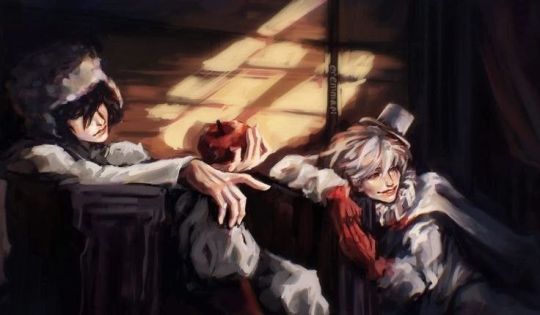
hi!! my name is mateo, also known as percy!! i go by he/him, though they/them prns are also alright; im trans & homosexual (as well as aromantic) I have many interests (which I will go into depth about, as well to explain what kind of content I'm planning to post :p) im diagnosed with type 1 autism, ADHD & c-ptsd, which, I will post alot about!! (rep, essays, etc) im also Hispanic, Columbian & Costa Rican. I speak both Spanish & English, I might make spelling or grammar errors as English is unfortunately not my first language!!
interests / fandoms
as you can see, im mainly into bsd, but there's others! such as, hxh, jjk, crk, sonic, saiki k, omori, young Sheldon, madoka magica, arcane, ouran high school host club, south park, ddlc, tdi, all of us are dead, goodnight world, world trigger, stranger things, pjsk, kny, eddsworld, bnha, fnaf, Steven universe, star vs the force of evil, the amazing digital circus, mlp, marvel/DC, mashle, the apothecary diaries, aot, Alice in borderland, devil may cry, black butler, the promised never land, darwin's game, frieren, death note, a silent voice, bird box, mop psycho 100, haikyuu, sword art online, Nana, fairy tail, banana fish, no game no life, tbhk, assassination classroom, the case study of vanitas, high rise invasion & more !
content / posting
im mostly going to be posting characters/shows/game/ships analysis, headcannons, writing pieces (such as essays, short responses, etc), (blank) week prompt's answers, I may also take requests .. you can also find me on ao3 :3
DNI / BYF
I don't dislike many people, other than the basic dni list. (proshippers, racist, homophobic, etc), other than that it would be bsd haters / atsushi haters. Anybody who fake-claims DID/OSDD systems because of dumb reasons and endosystems.
5 notes
·
View notes
Text
Are they agender?
disclaimer: this is a hc, not speculating on what the writers intentions were.
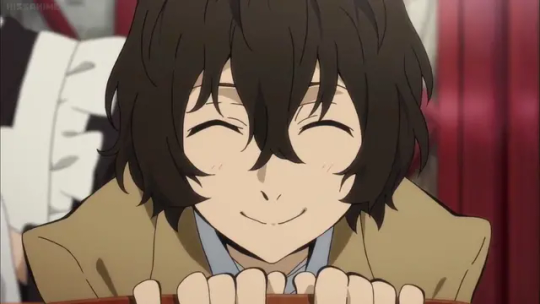

divider by cafekitsune
reason under the cut!
(im using they/he pronouns for Dazai here for coherence and cohesion purposes, and also bc they use he/him in every other language)
In the original language (japanese) Dazai refers to themselves with "watashi", which is a first person gender neutral pronoun
Now, going into "character analysis" (headcanon) territory (im really stretching this), Dazai's ability (power) is called "No Longer Human" (name coming from irl Osamu Dazai's novel) and his character was slightly based off the protagonist of said novel, and reading it one of the main traits of the mc is how unhuman and alienated he feels in comparison to other people. Dazai's feelings are mostly an enigma, plus if we consider his interactions with other characters, it makes sense to think that he would think of themselves as "unworthy of being human" (/reference) Now, if we look at it from an agender perspective: being agender in a gendered society would really propel Dazai's "I'm no longer human" self-alienating way of thinking
*Not me feeling the need to heavily explain my headcanons as if I can't hc whatever I want*
#bsd#bsd osamu dazai#osamu dazai bsd#agender#agender headcanon#bungou stray dogs#bungo stray dogs#poll#polls#lgbt headcanons#anime
13 notes
·
View notes